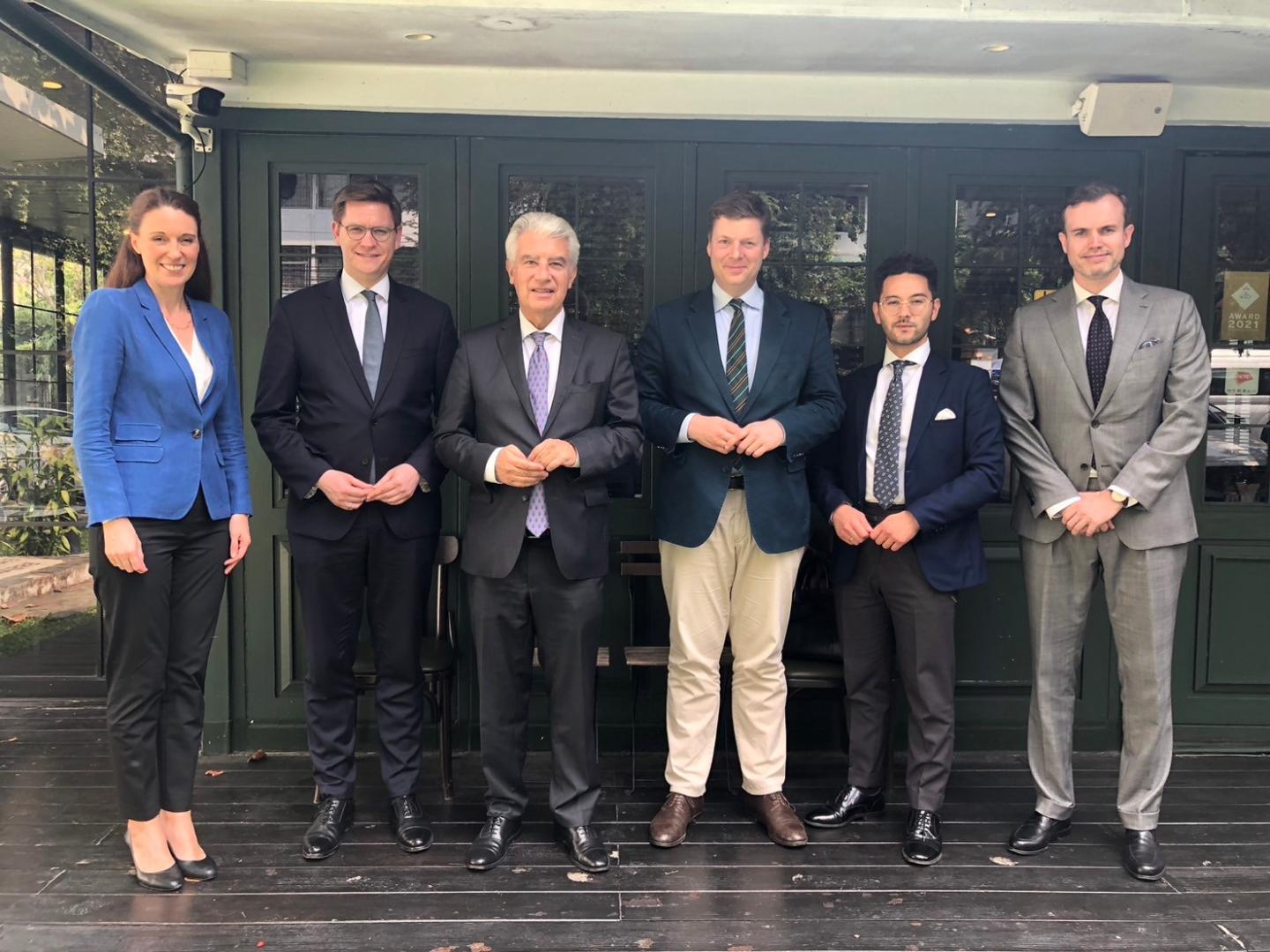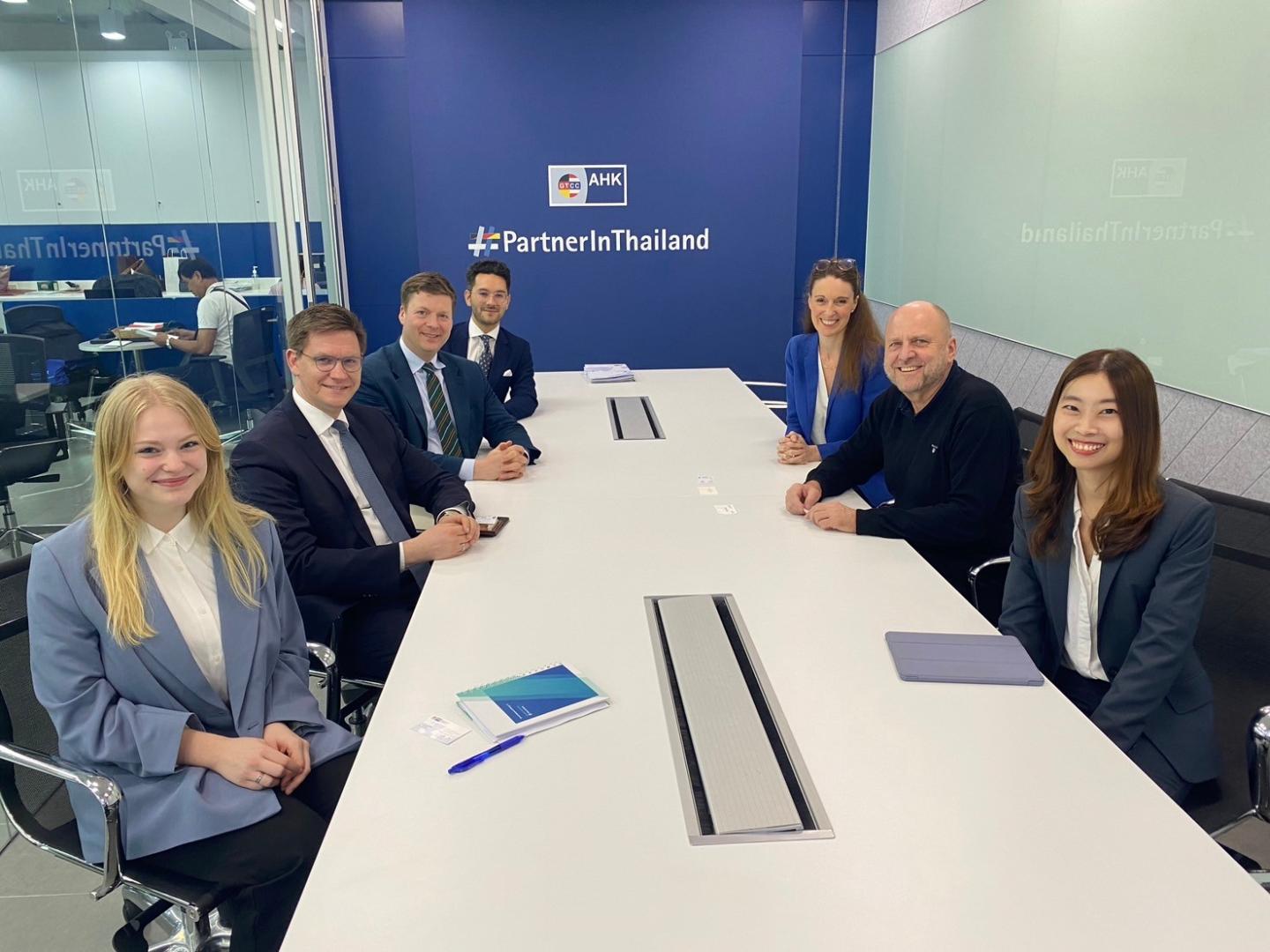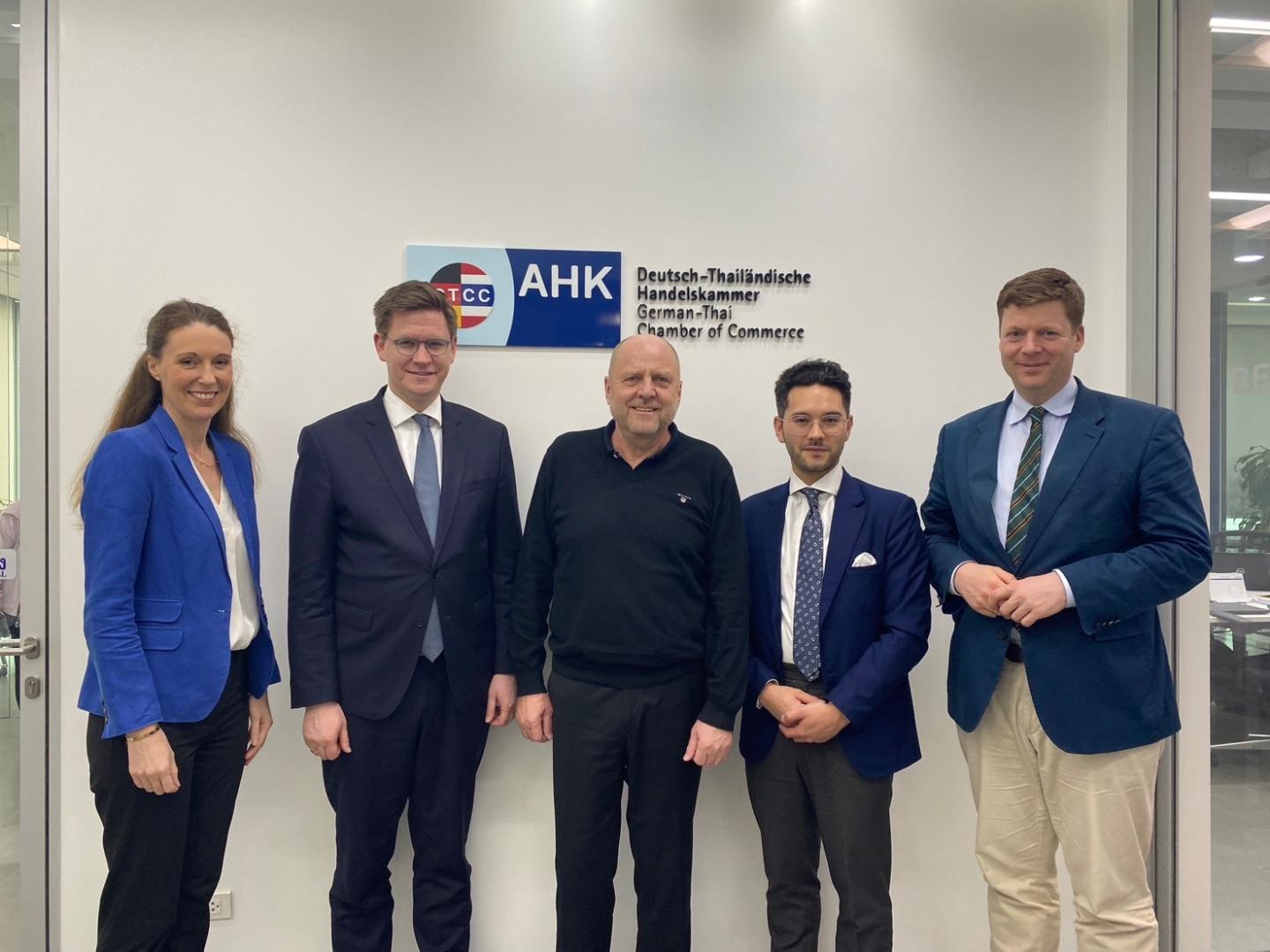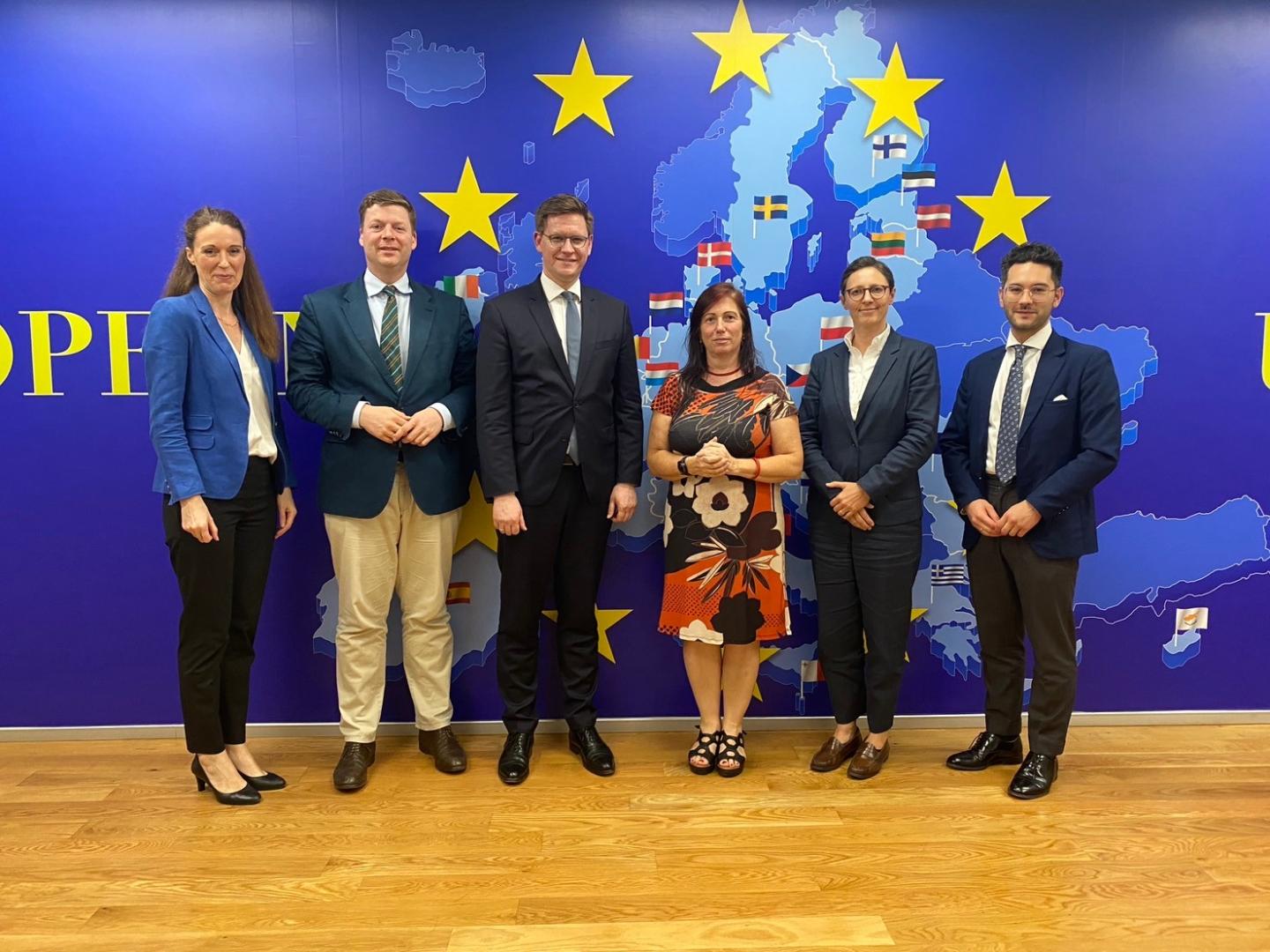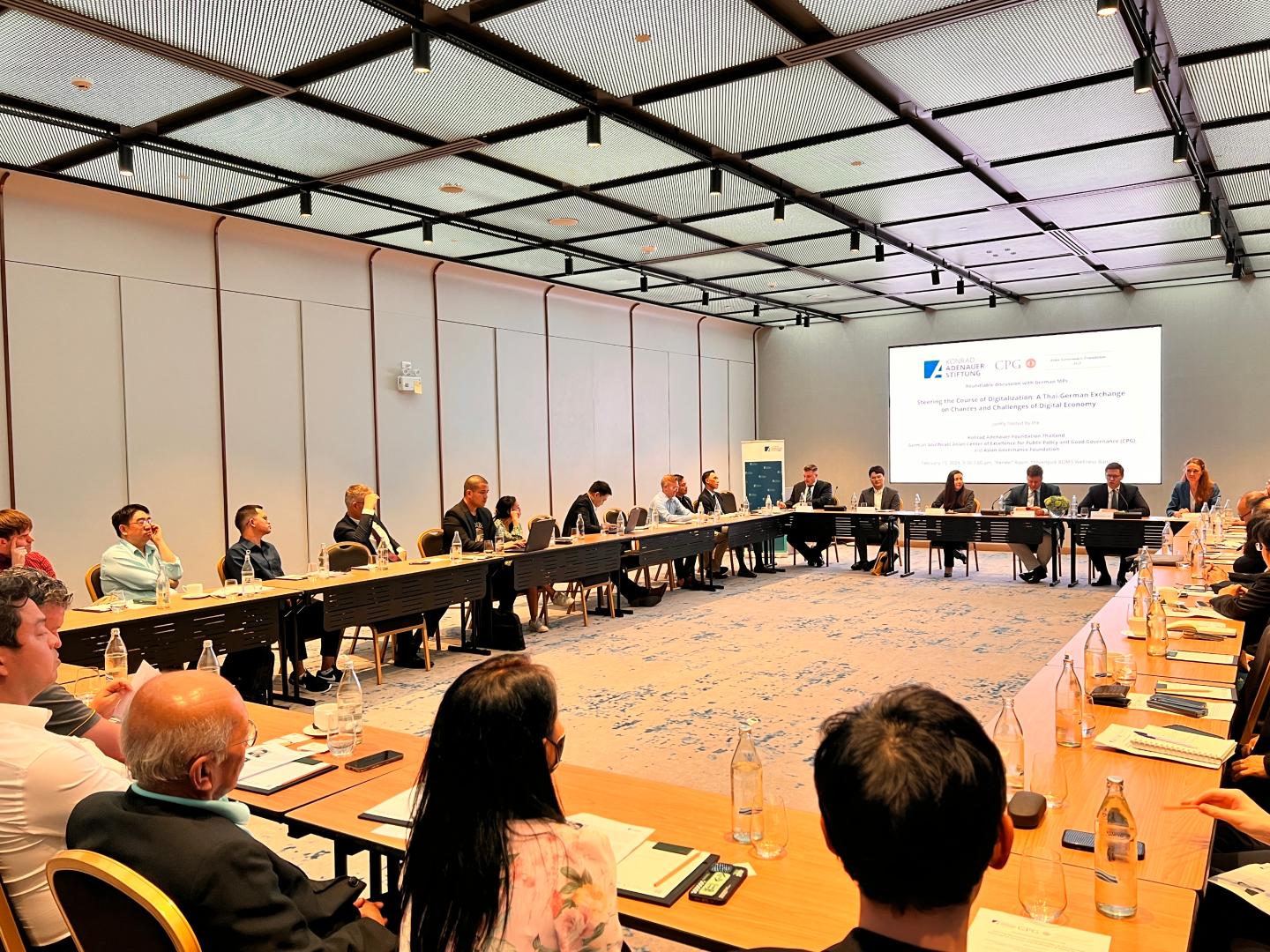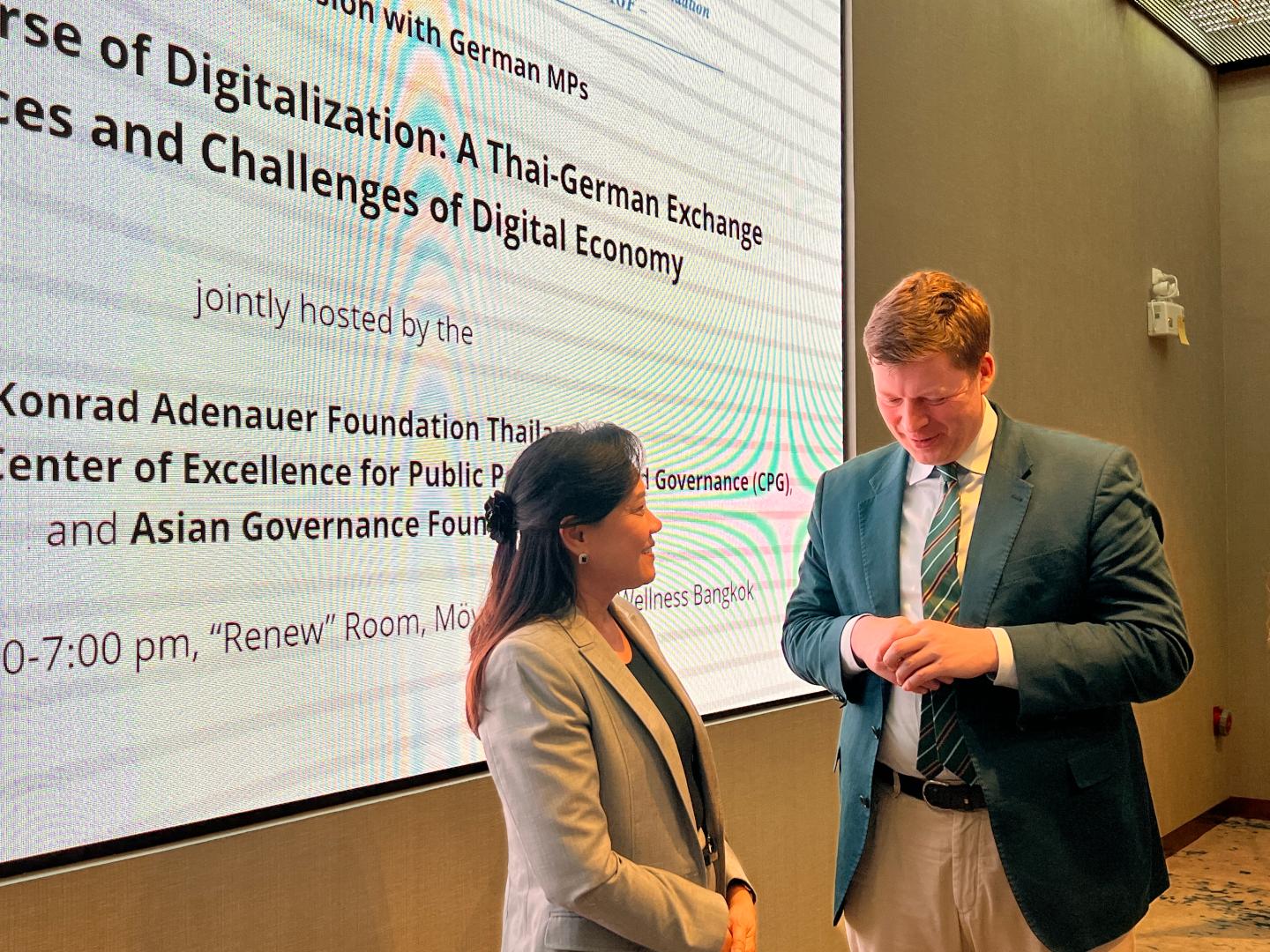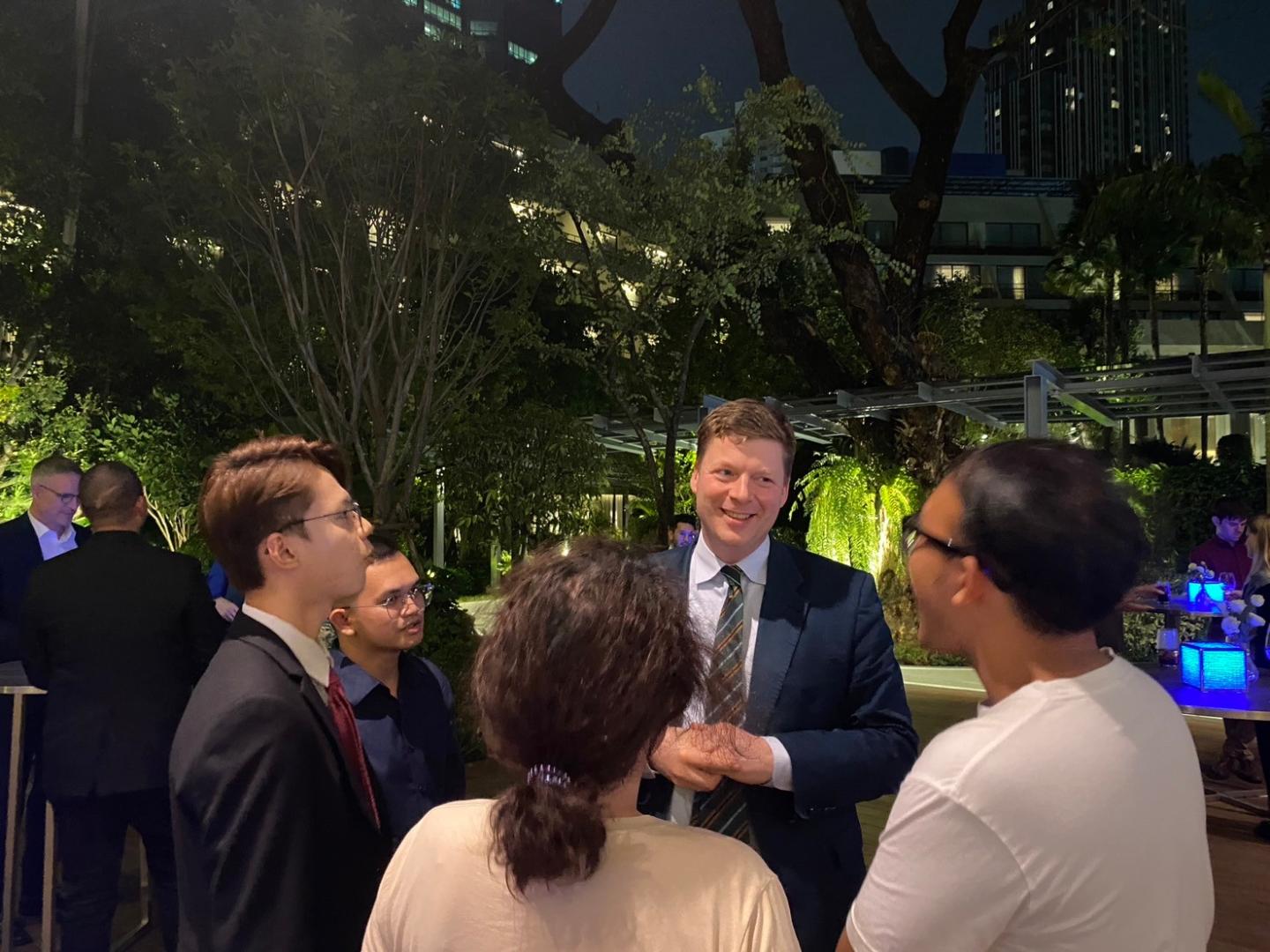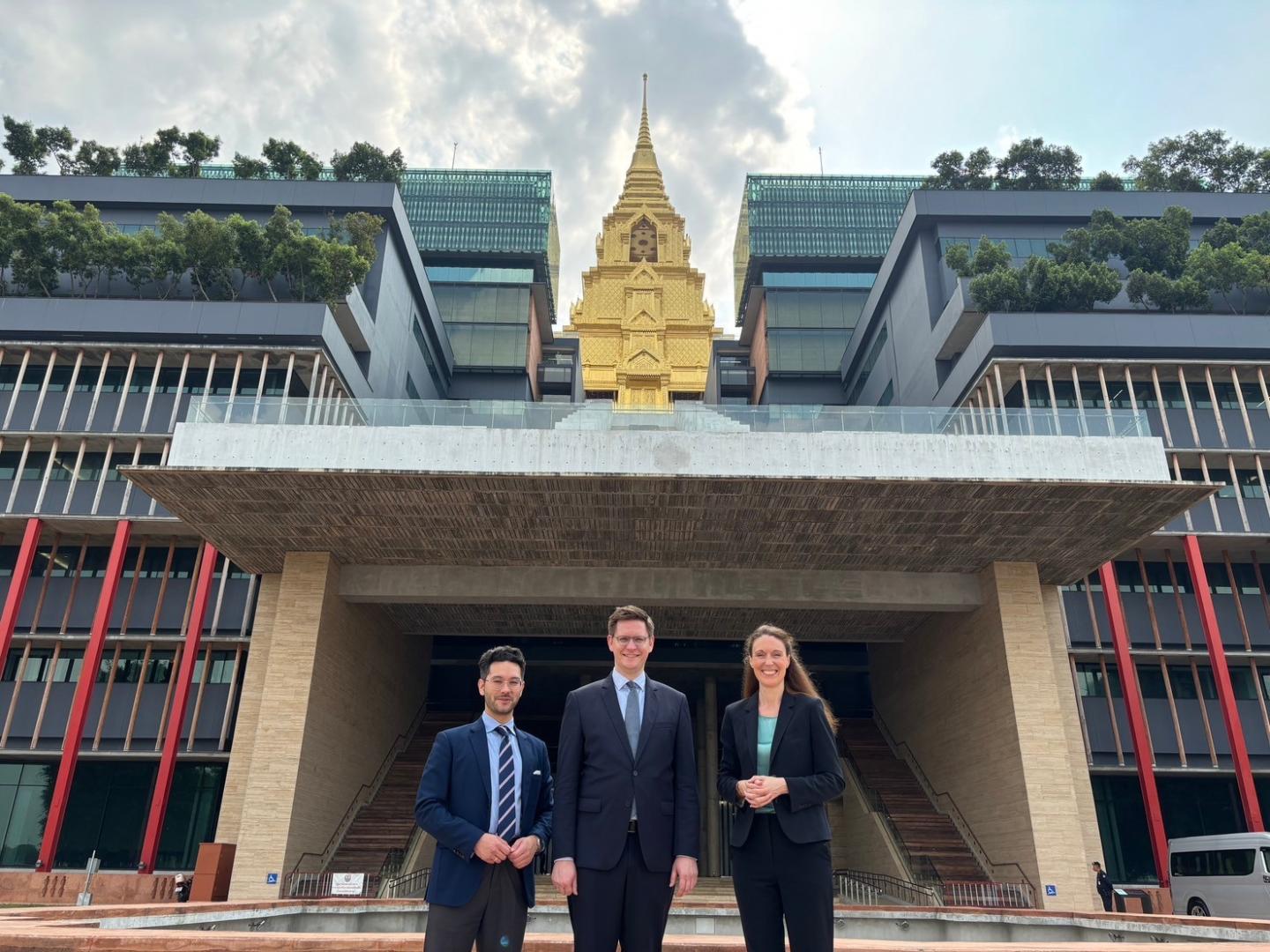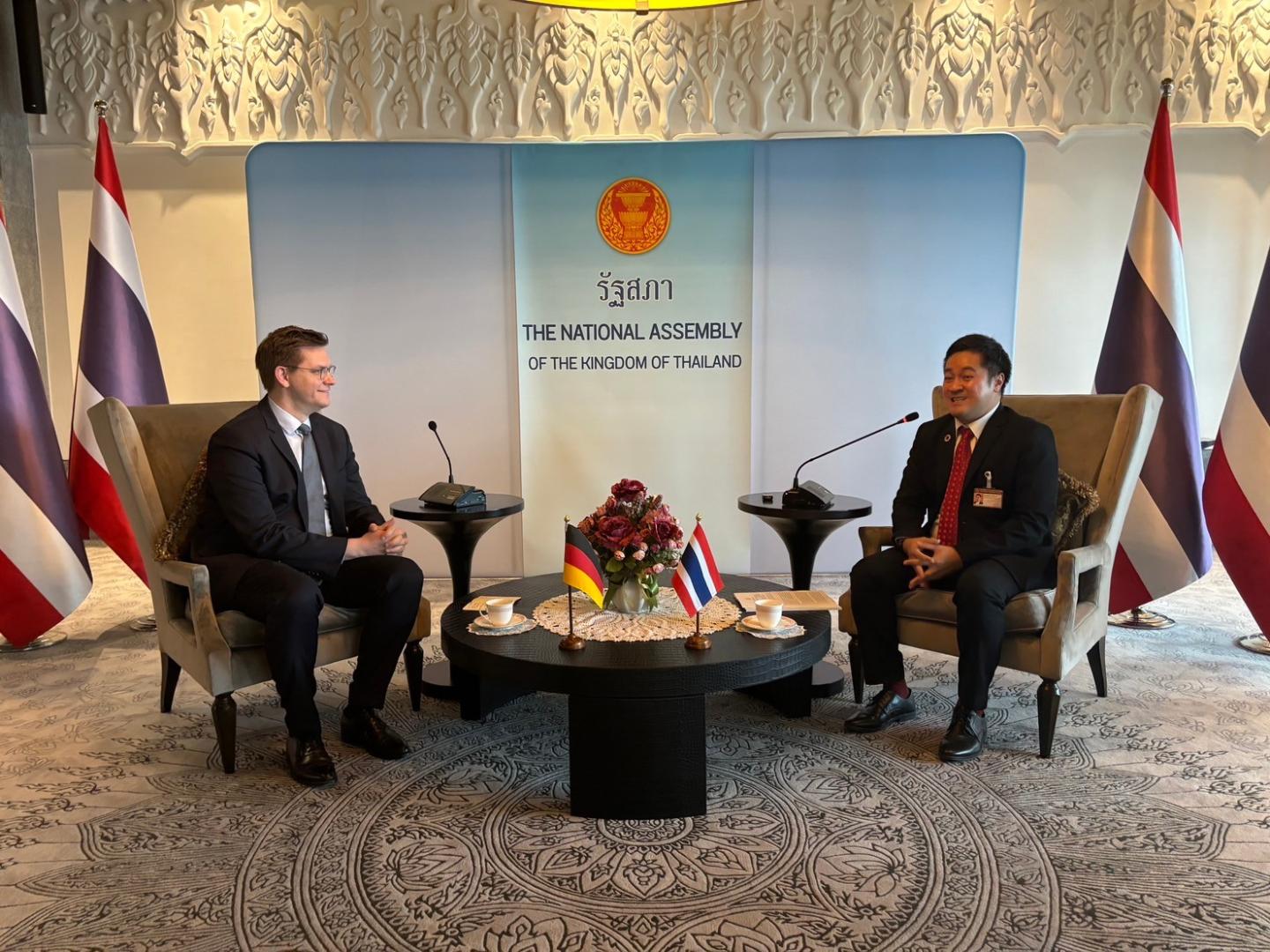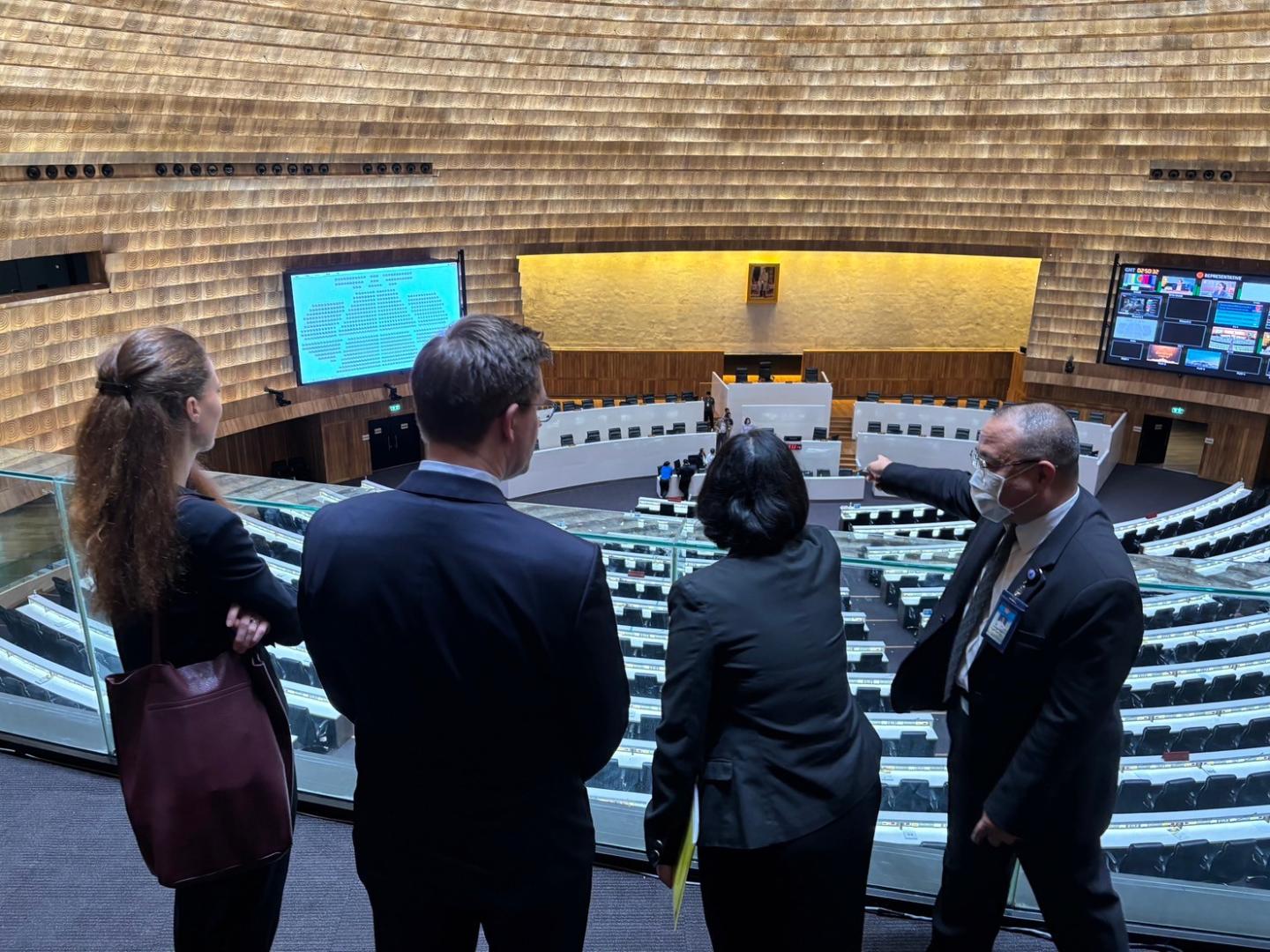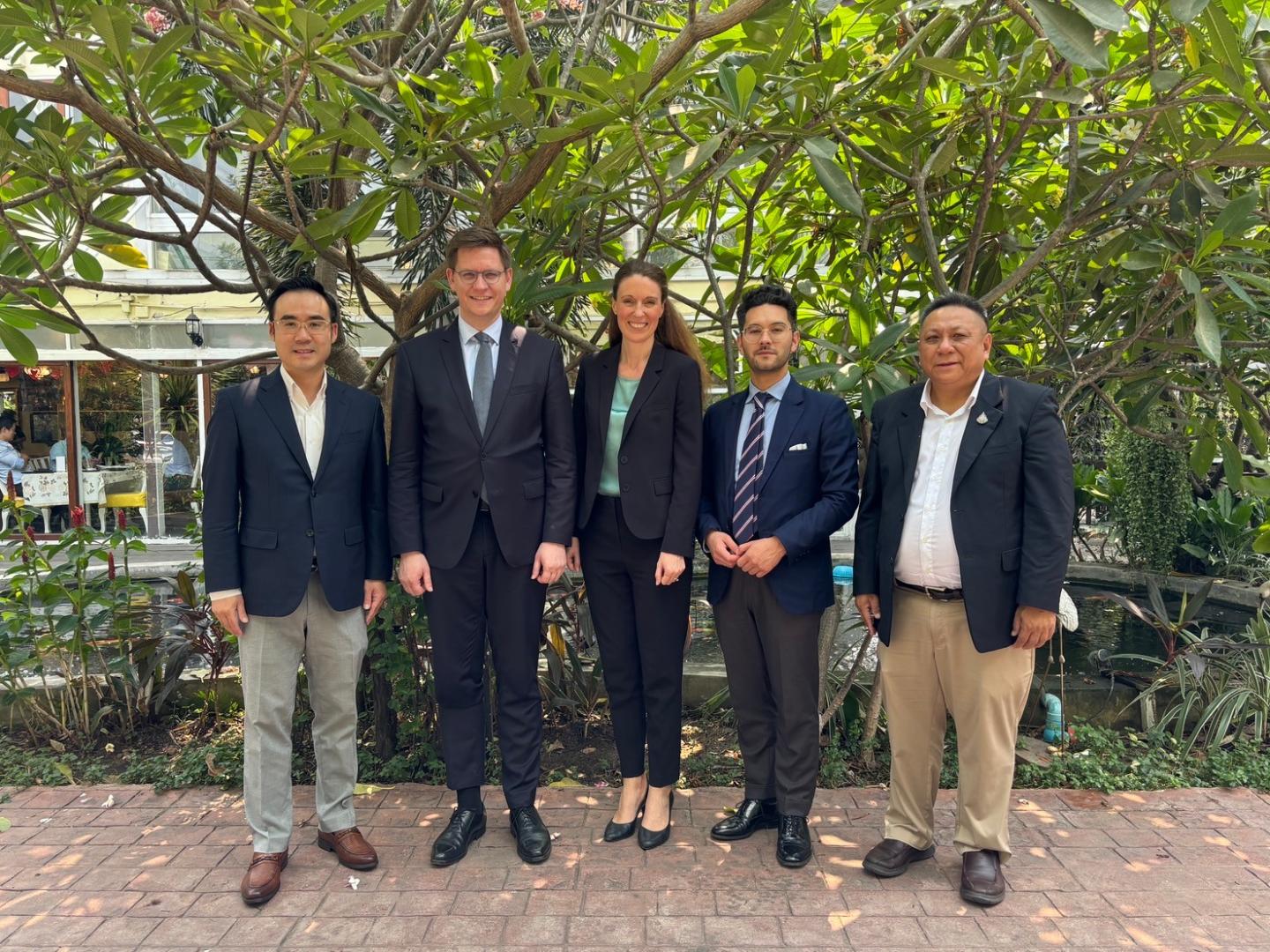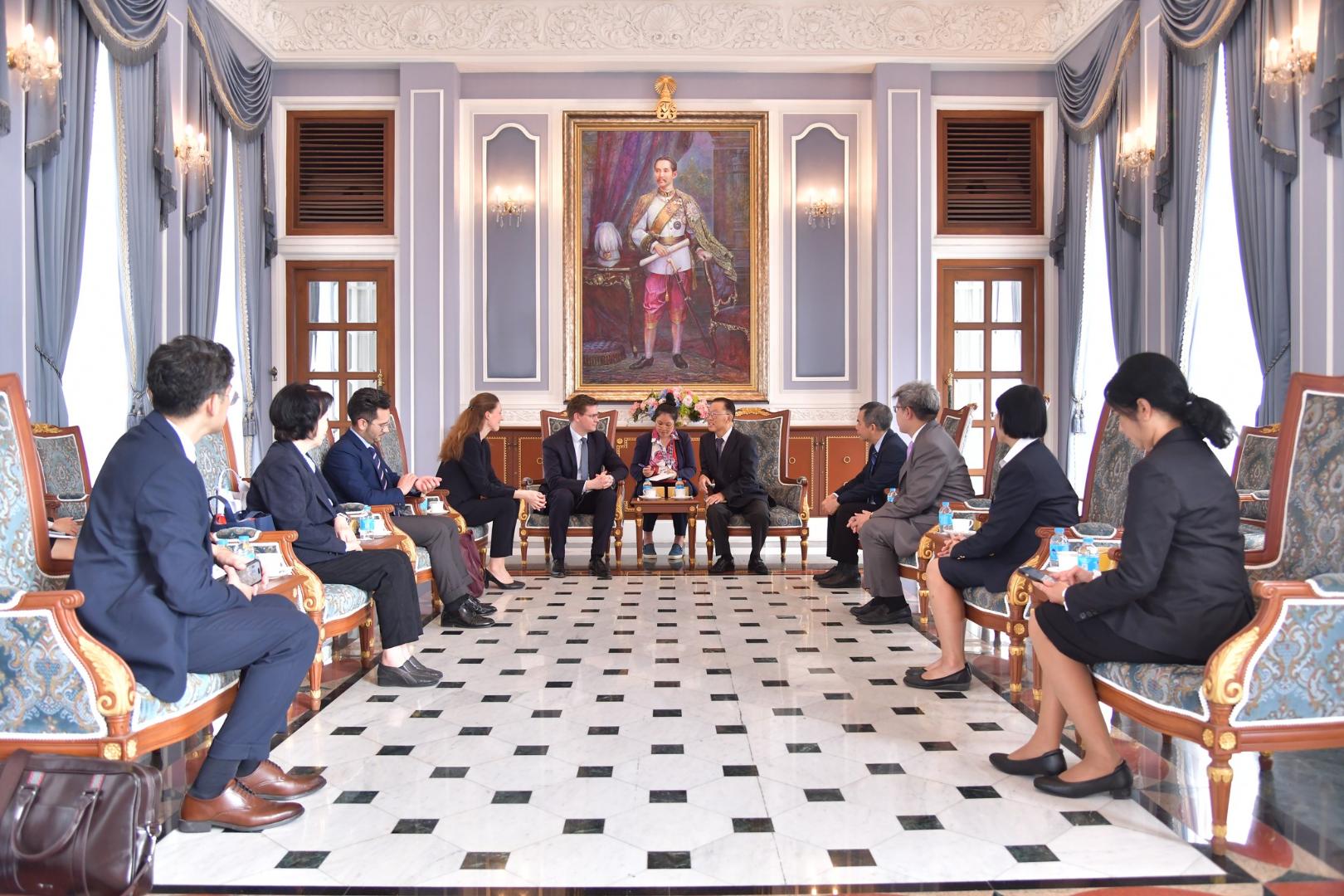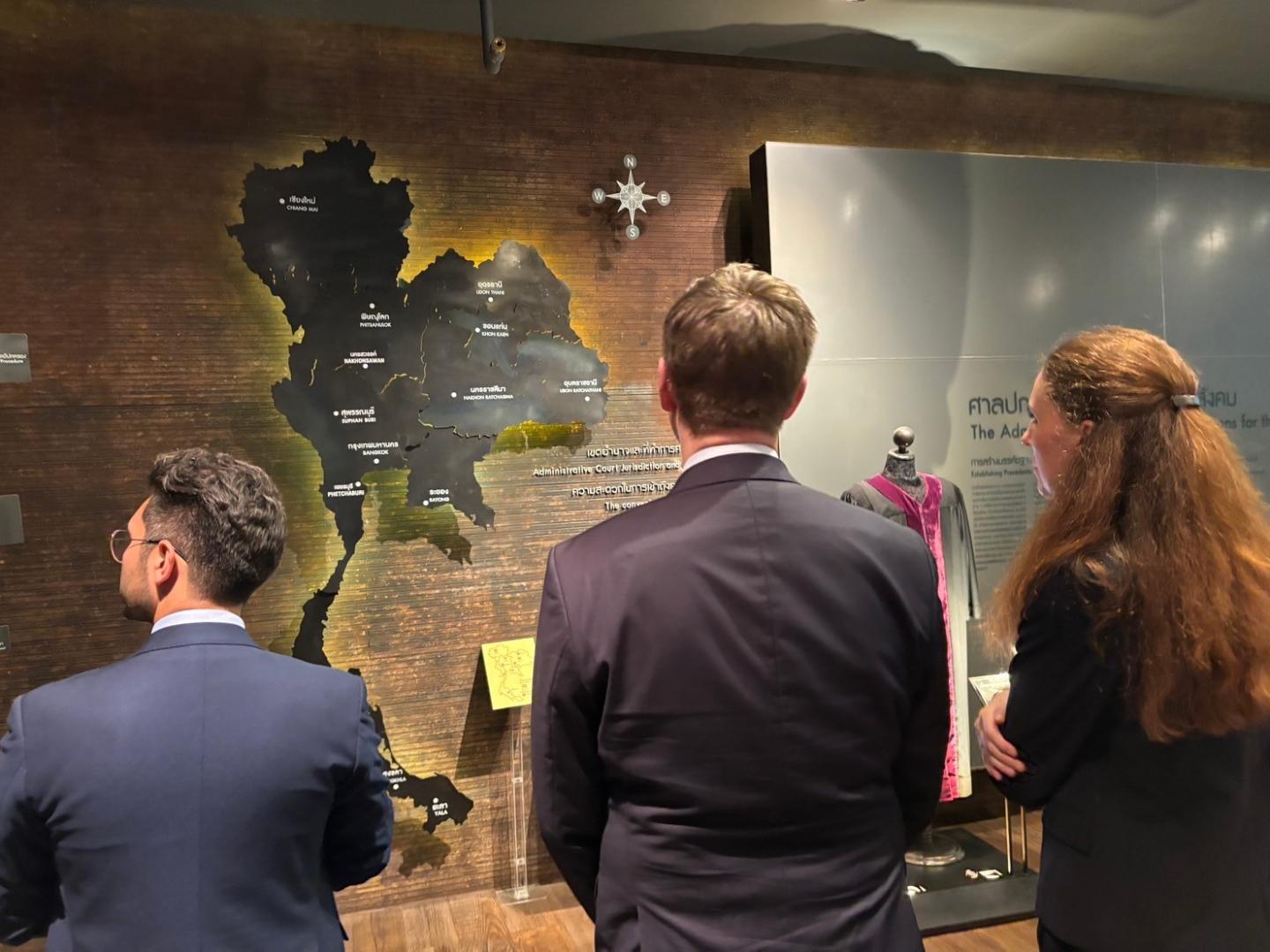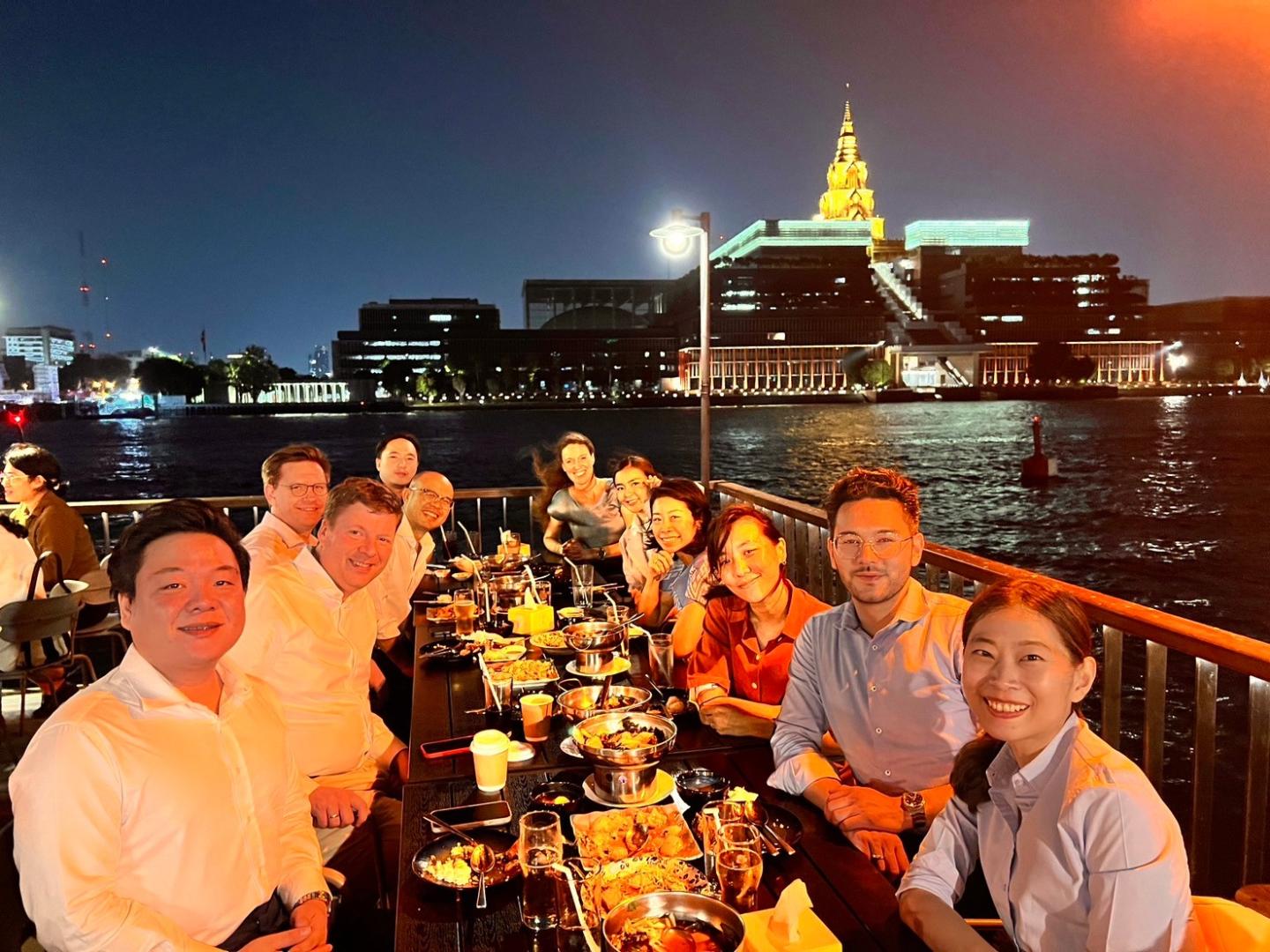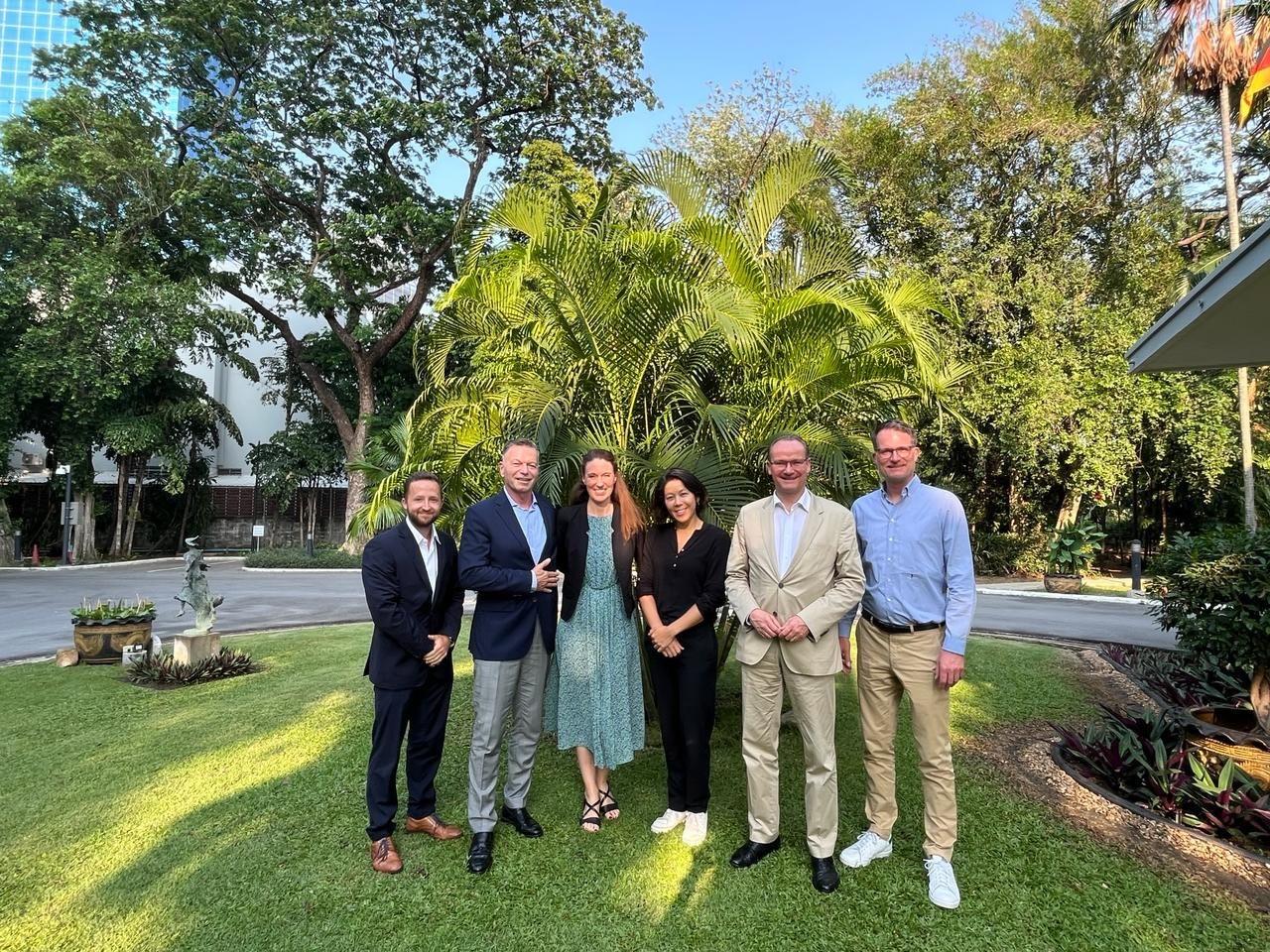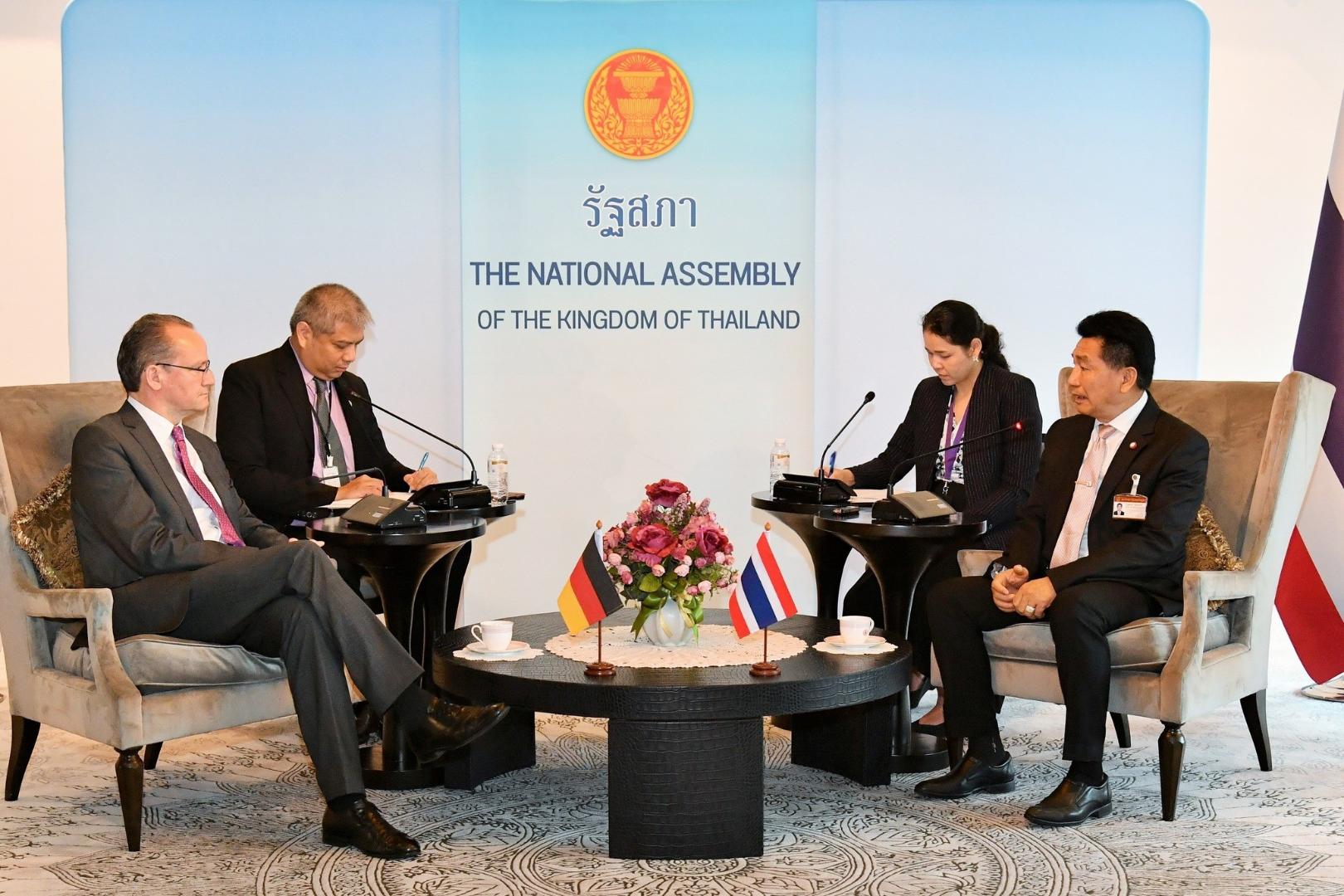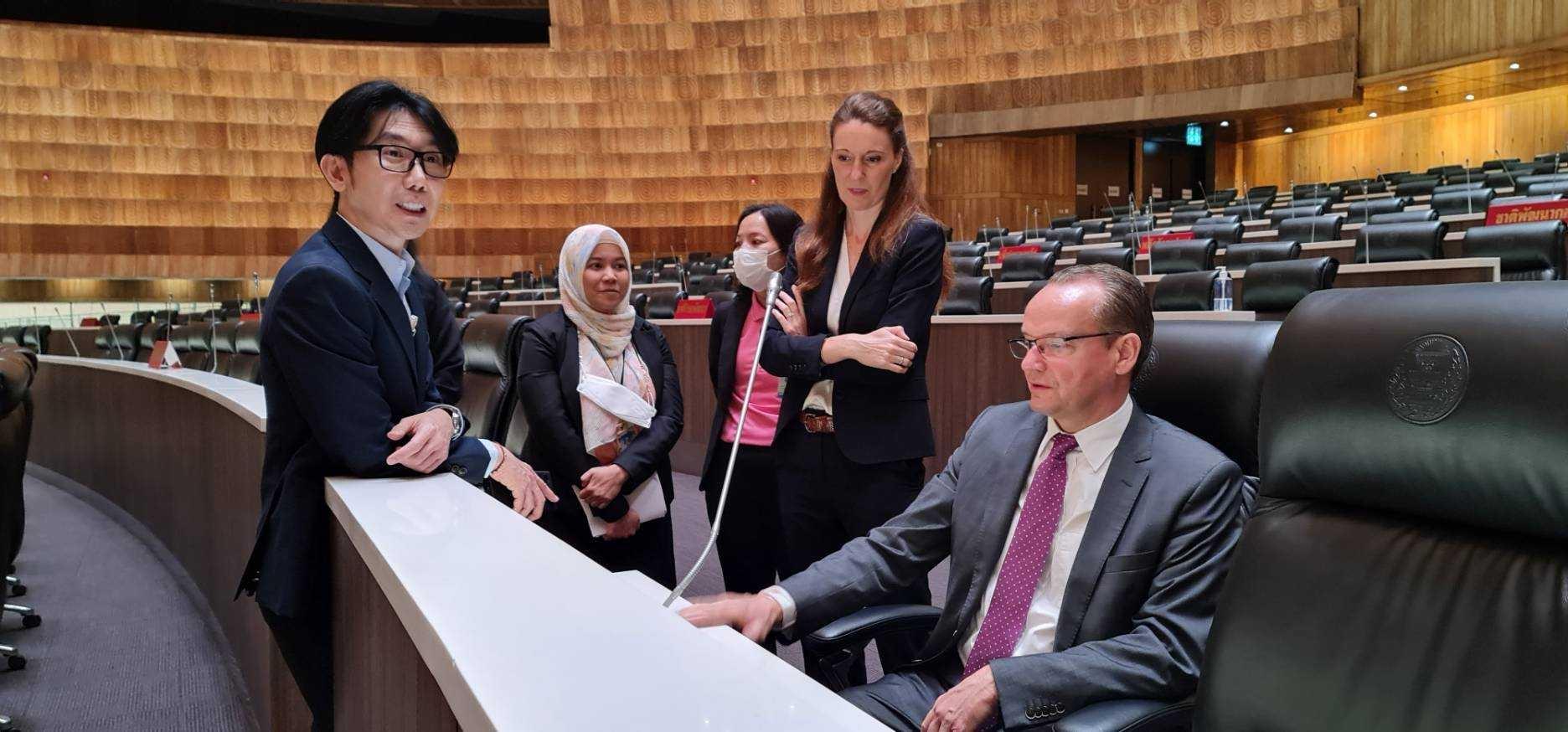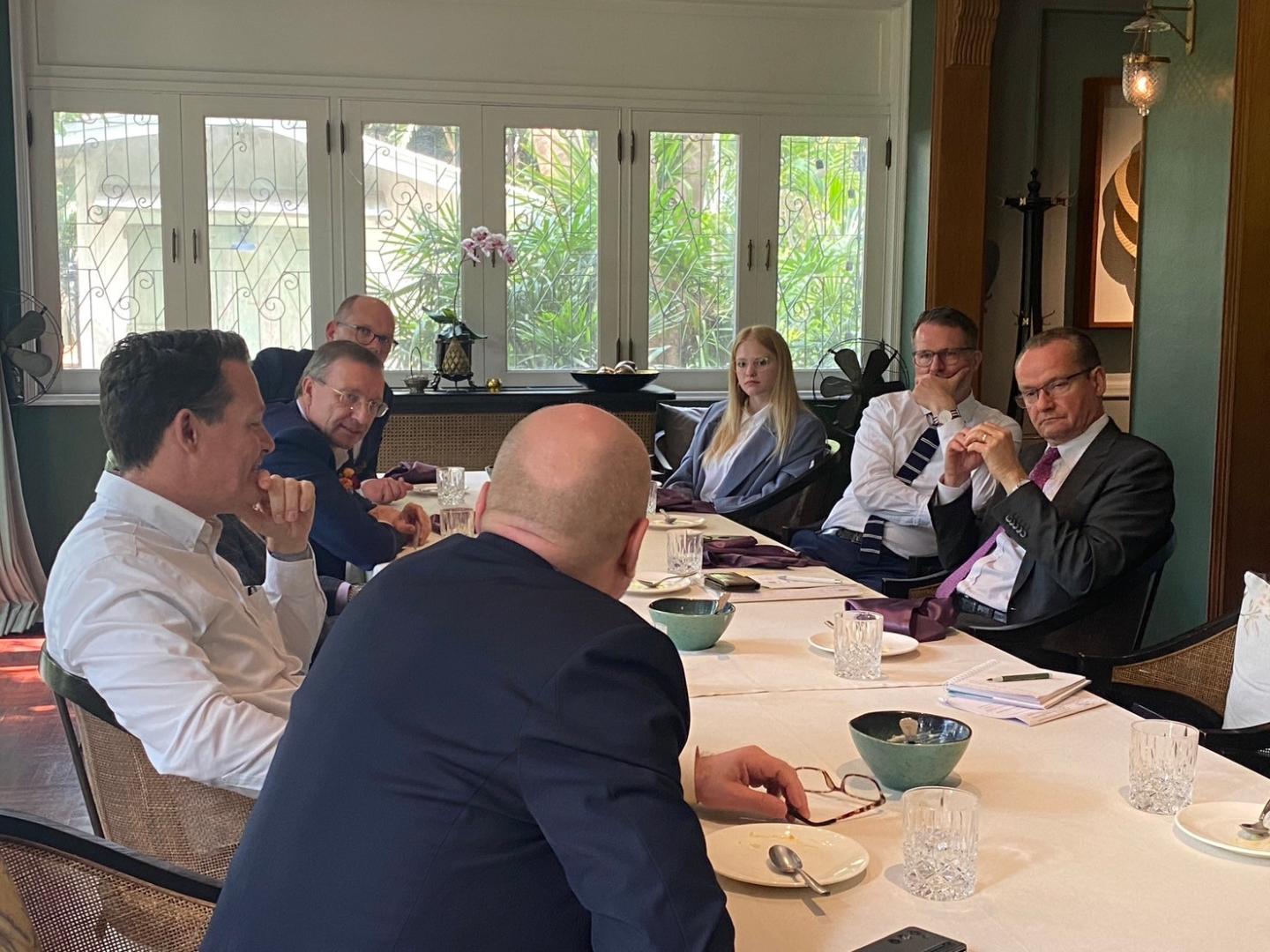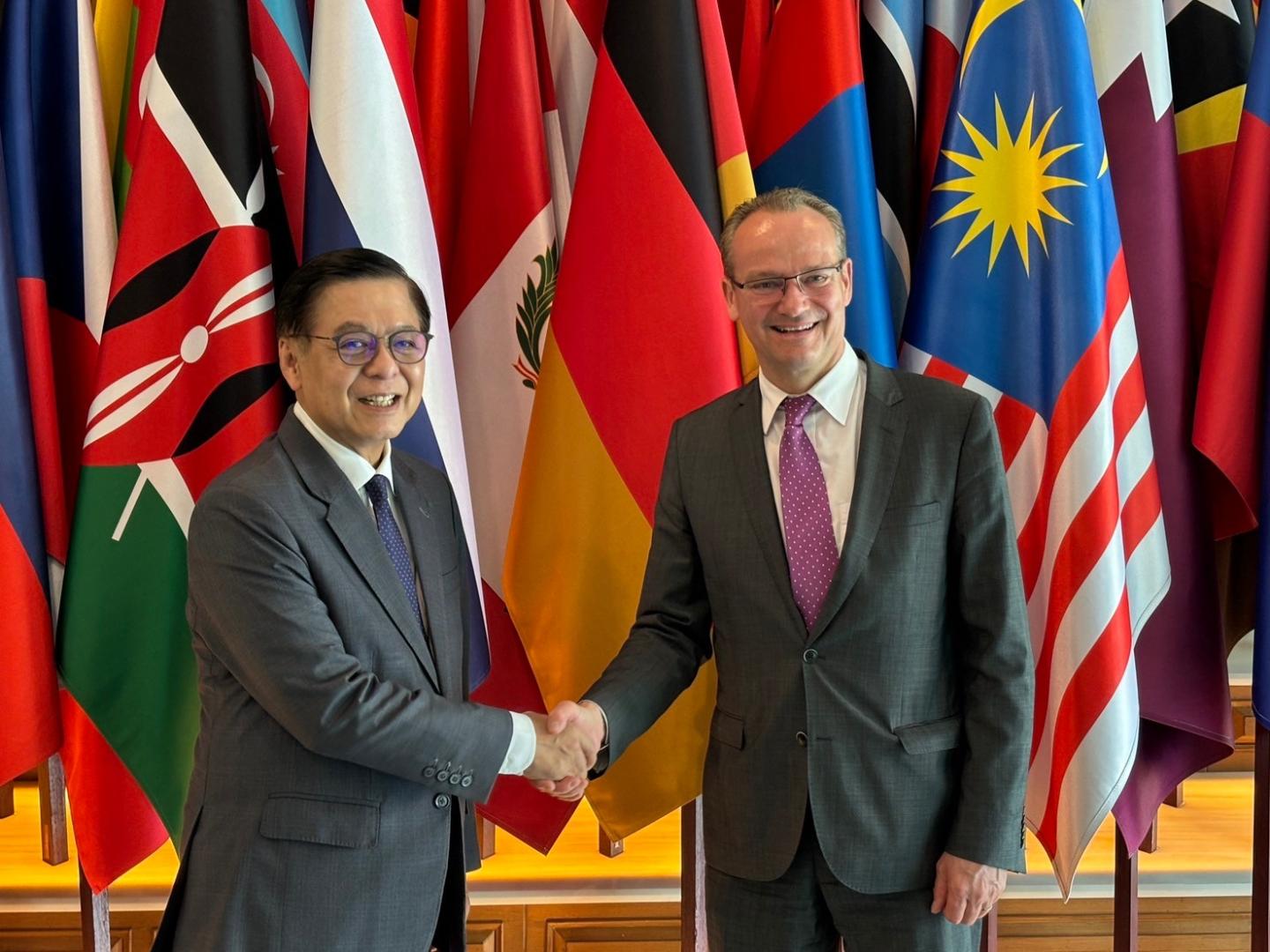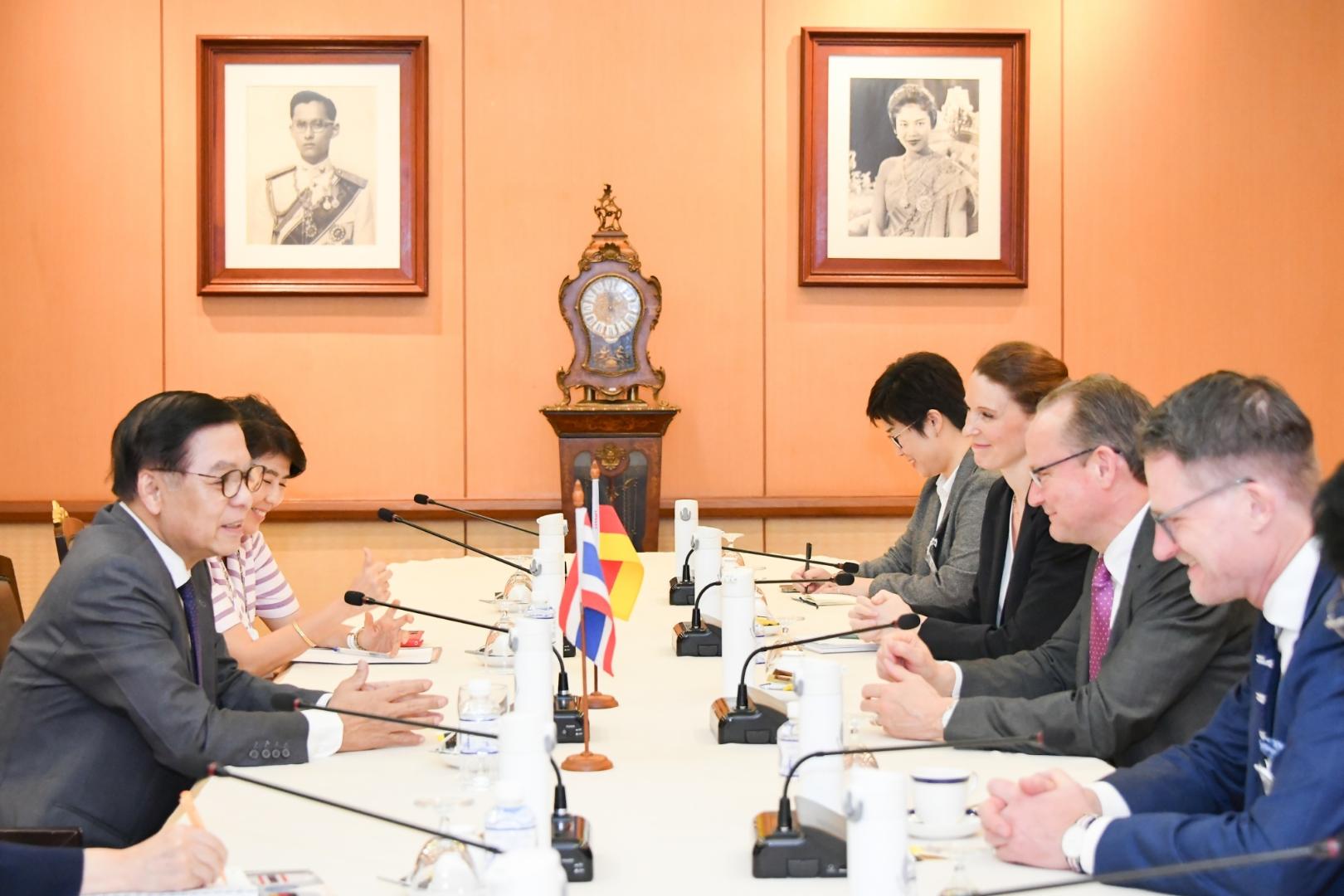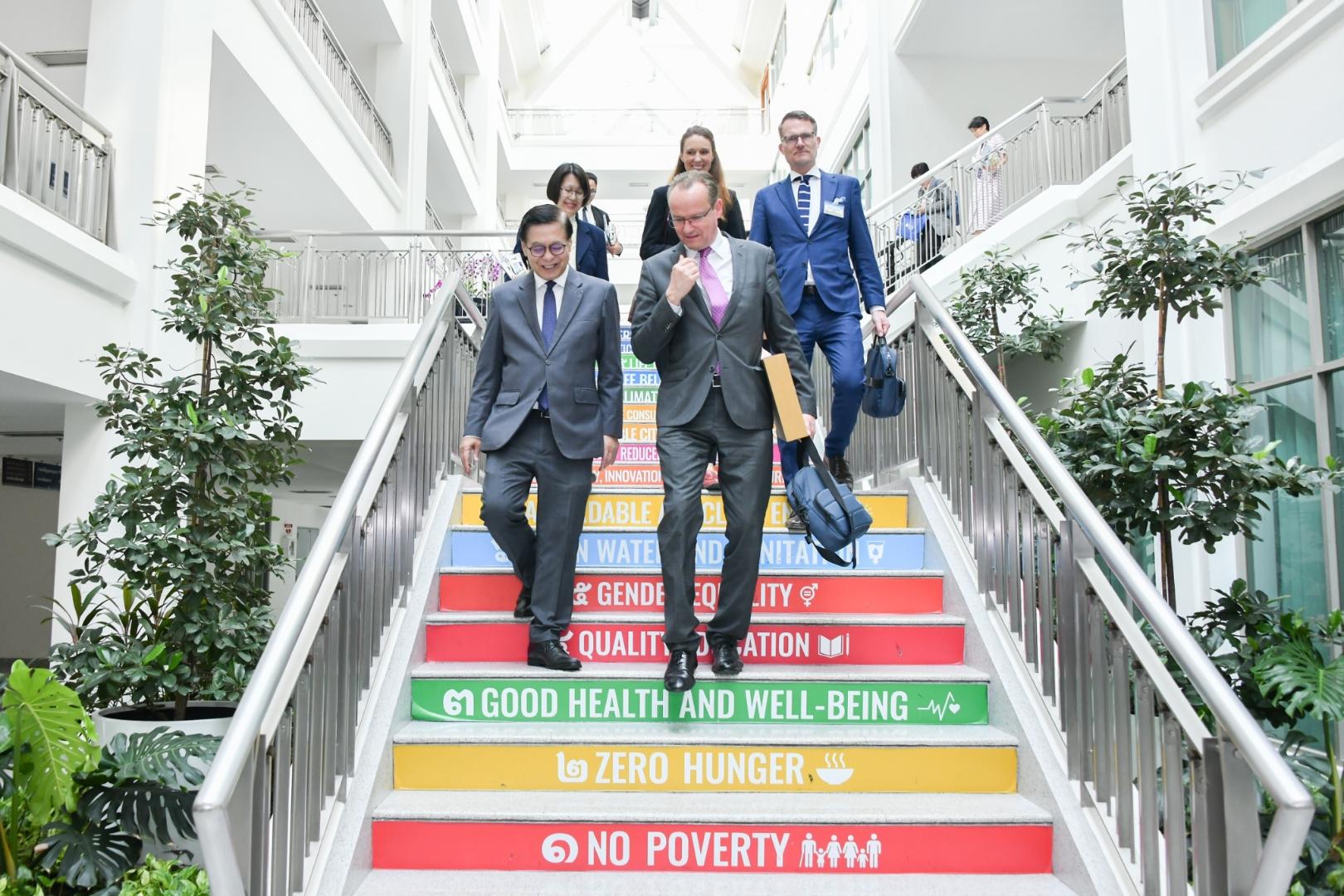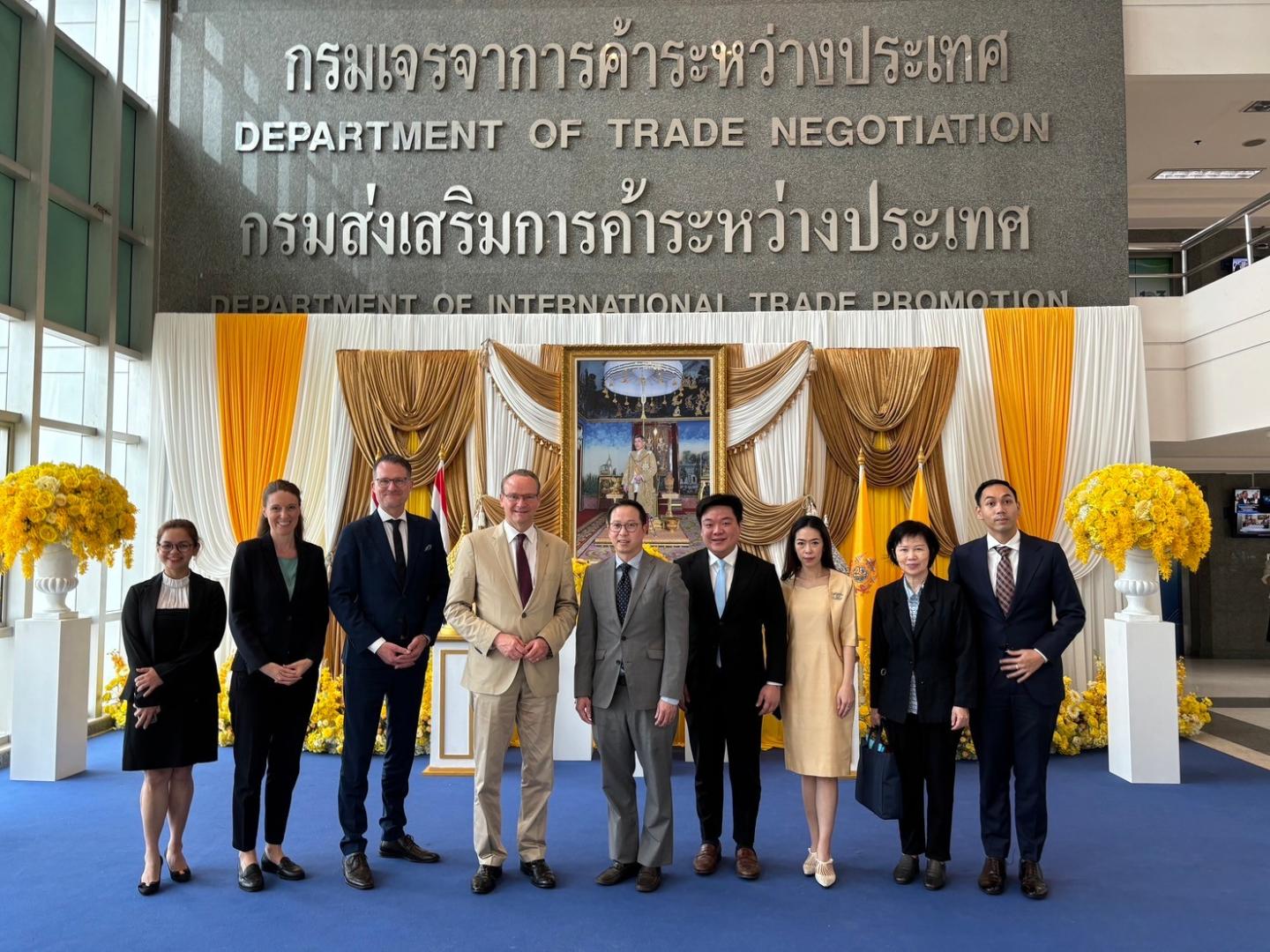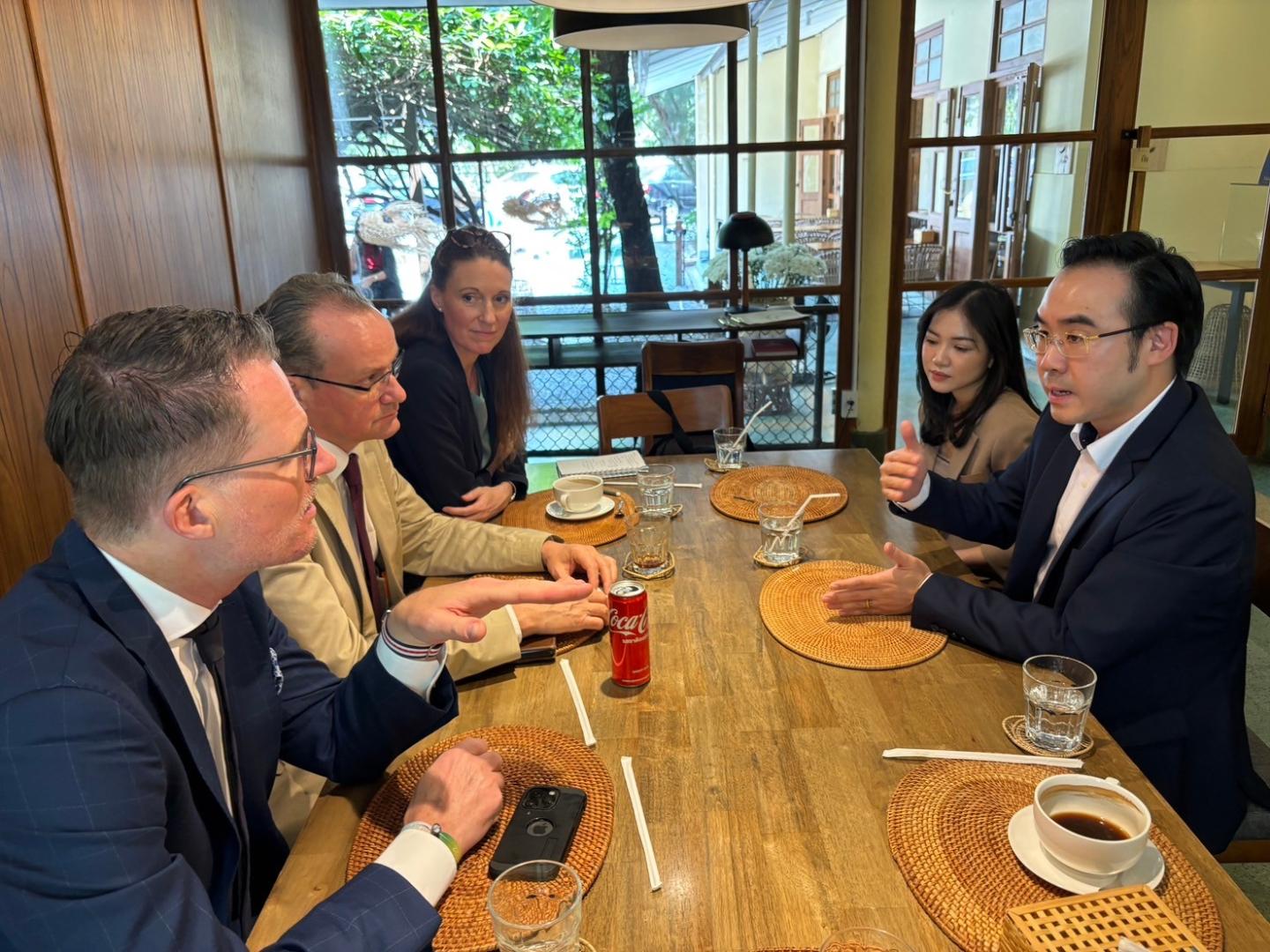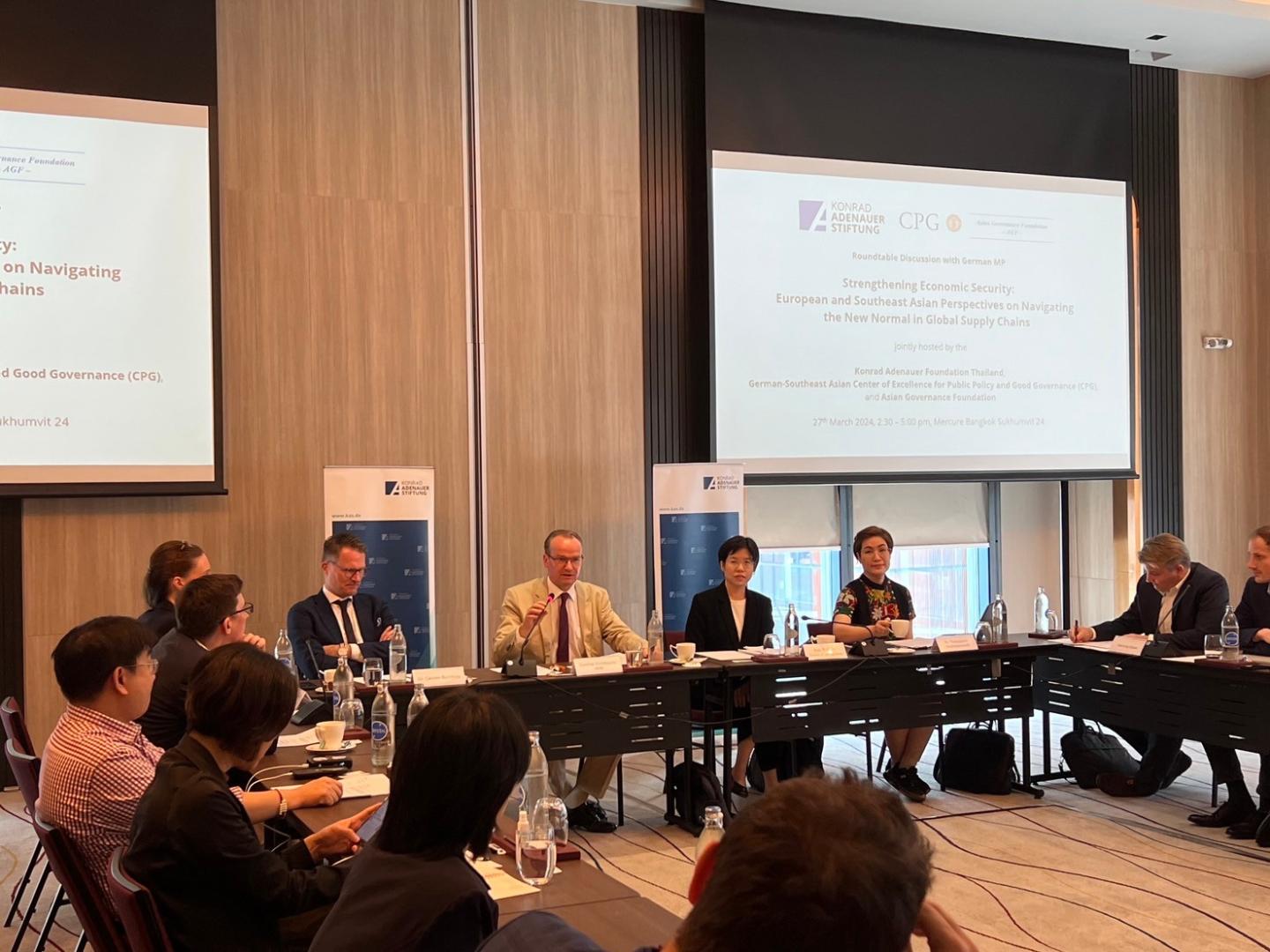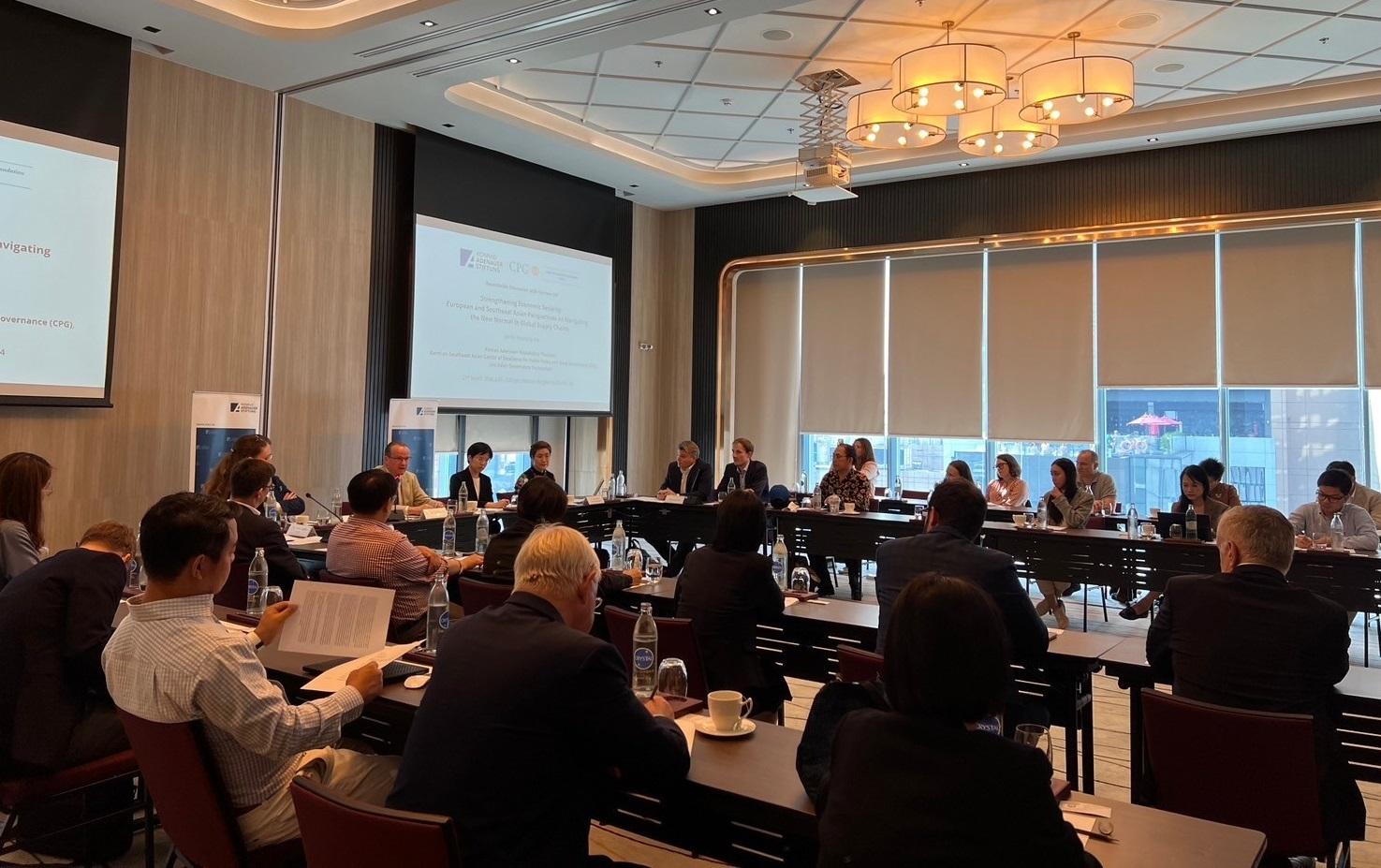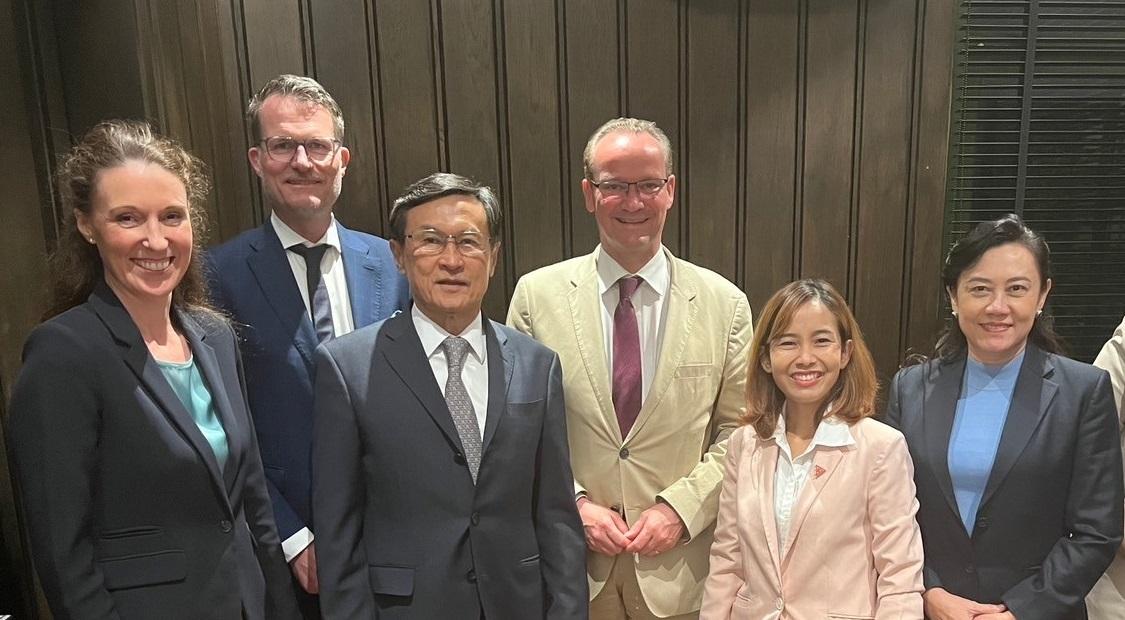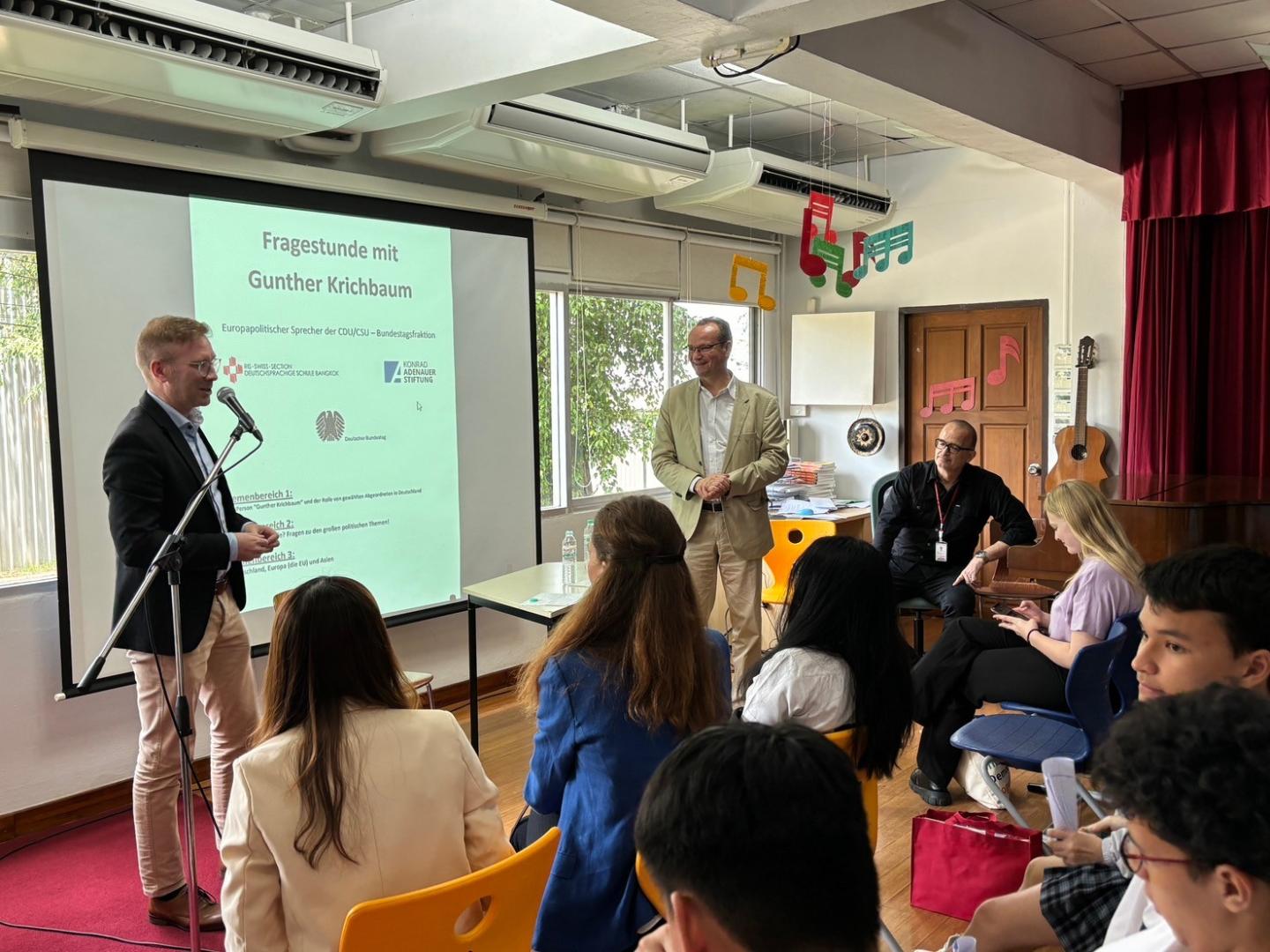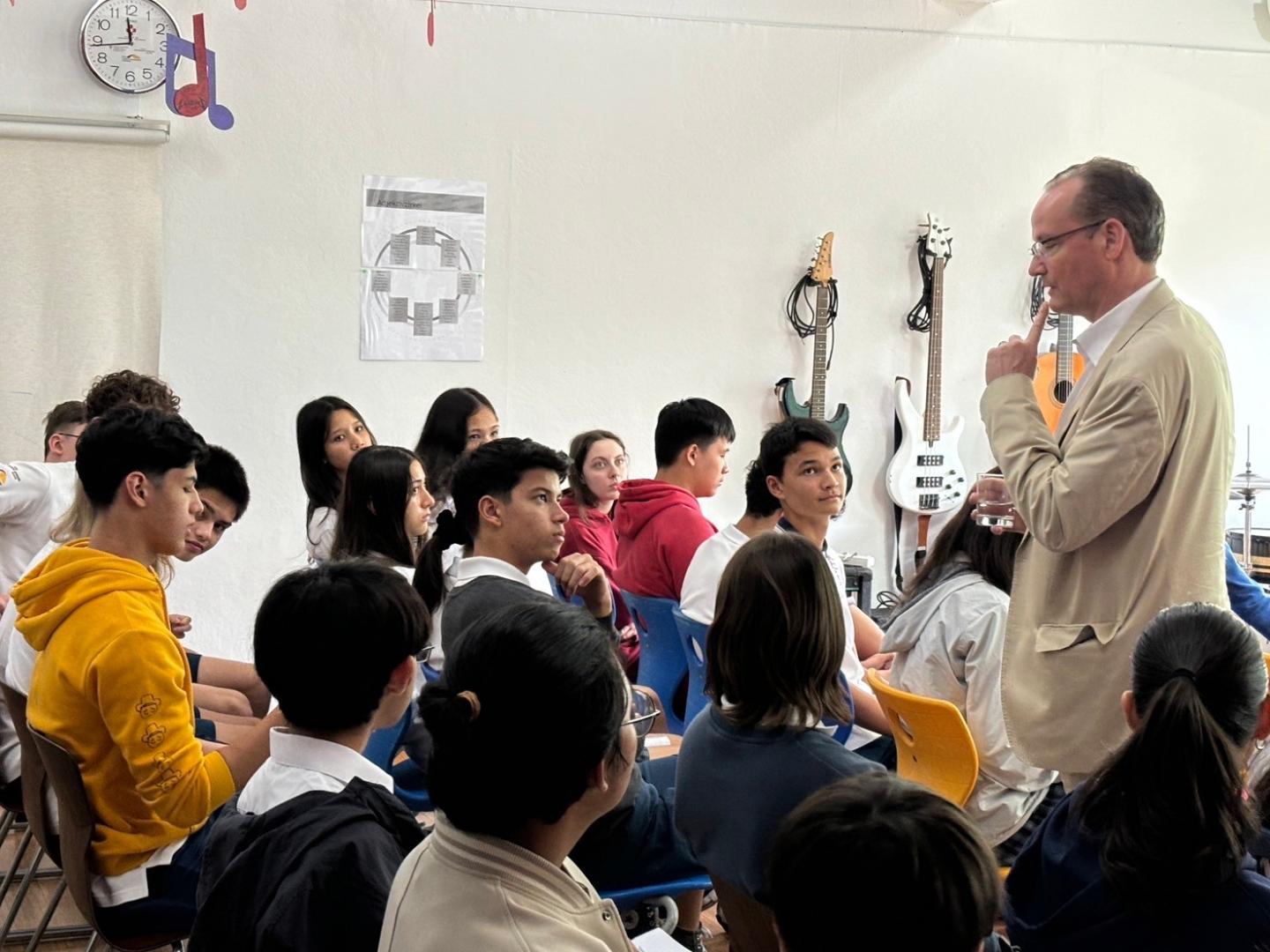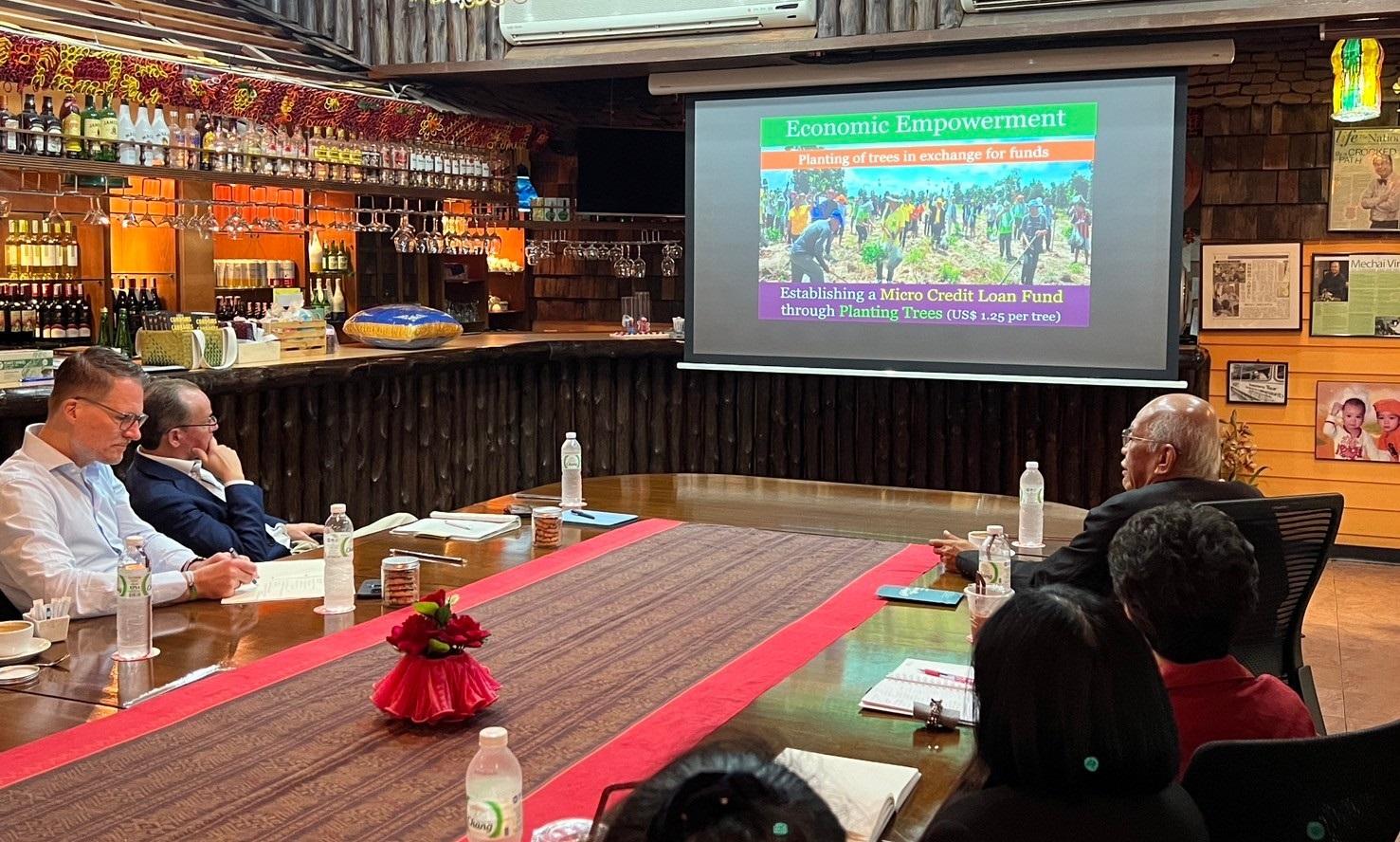The Konrad Adenauer Foundation Thailand received two Members of the German Bundestag (MdB), Mr. Johannes Steiniger and Dr. Stefan Heck, during their visit to Thailand from 15-16 February 2024. The main purpose of their visit was to engage in discussions and exchange ideas with representatives from the Thai government, private sector, and civil society organizations. The focus was on enhancing cooperation between Thailand, Germany, and the EU, with particular emphasis on strengthening bilateral relations, fostering economic partnerships, bolstering the rule of law, and promoting parliamentary democracy and civic engagement.
The two members of the German Bundestag commenced their program by holding discussions with the German Ambassador to Thailand, H.E. Dr. Ernst Reichel, and Mr. Maximilian Müller, First Secretary for Political and Protocol. Their talks centered on current developments in Thailand and their implications for politics, security, trade, and society. During a meeting at the Delegation of the European Union to Thailand, Mr. Johannes Steiniger and Dr. Stefan Heck received a comprehensive briefing on Thai-EU cooperation, gaining insights into various topics such as Thai-EU relations, the signing of the Thailand-EU Comprehensive Partnership and Cooperation Agreement (PCA), and the potential opportunities and challenges associated with a future Thailand-EU Free Trade Agreement (FTA), which both parties expressed eagerness towards concluding.
Regarding economic cooperation, Mr. Steiniger and Dr. Heck held a meeting with Dr. Roland Wein, Director of the German-Thai Chamber of Commerce, to delve into economic dynamics in Thailand and Southeast Asia amidst growing regional tensions. They explored Thailand's comparative advantages in attracting foreign investments compared to its Southeast Asian counterparts. While the Thai government actively promotes green economy, electro-mobility, and digitalization, it grapples with challenges in nurturing a skilled workforce to tackle aging demographics and sustain economic competitiveness within the region.
As digitalization and the digital economy have become increasingly important, Mr. Steiniger and Dr. Heck participated in a panel discussion titled “Steering the Course of Digitalization: A Thai-German Exchange on Chances and Challenges of the Digital Economy” alongside Assoc. Prof. Dr. Juthathip Jongwanich from the Faculty of Economics at Thammasat University, and Mr. Nopparat Lalitkomon, a partner at the law firm Tilleke & Gibbins representing the private sector. The panel underscored the growth of digital industries in Thailand, with projections indicating further expansion of the sector. With notable improvements in digital infrastructure and accessibility in Thailand over the last decade, access to high-speed internet has become commonplace in everyday life. Moreover, the Thai government also supports the digital economy through numerous programs, including the establishment of digital parks to nurture startup businesses. The significant growth of the digital industry will serve as a substantial driving force towards Thailand’s digital transformation. However, the country still faces various challenges, such as regulatory frameworks i.e. the Cybersecurity Act and restrictive business guidelines, along with obstacles related to skilled labor shortages in the deep-tech sector and corresponding difficulties in attracting sufficient investment in this area.
Regarding Germany, Dr. Heck underscored the critical importance of cybersecurity and emphasized the need for independent state-owned network operators to ensure reliable, rapid, and effective communication during disaster management and emergency responses. Additionally, Dr. Heck delved into the complexities of Germany's fragmented data protection regime, advocating for streamlining the system by merging the federal and various state-level agencies into a single overarching national authority on data protection. The panel expressed a collective desire for secure and robust infrastructure development, comprehensive education, and flexible legal frameworks to adapt to the ongoing digital transformation.
As a member of the German Bundestag’s Committee on Finance, Mr. Steiniger provided insights into policy initiatives in Germany geared towards embracing digitalization. He discussed efforts to implement blockchain technology in finance and payment processes, as well as enhance cybersecurity regulations. Moreover, Mr. Steiniger addressed the challenges that digitalization potentially poses to democracy. He stressed the importance of balanced policymaking that encourages innovation while also addressing regulatory concerns both within Germany and at the EU level. (You can read the full event report here.)
In Bangkok, the members of the German Bundestag also had the opportunity to pay a courtesy call to the Vice President of the Supreme Administrative Court of Thailand, Mr. Vishnu Varunyou, together with Secretary-General of the Office of the Administrative Courts, Mr. Prapat Tansuwannont. The purpose of this visit was to hear about the progress of the Thai Administrative Courts in developing a comprehensive e-court system, and to discuss cooperation between Thailand and Germany to advance judiciary work and standards. The discussion also included ways to fortify the rule of law and promote innovative development in administrative procedures through international cooperation, notably with the involvement of the Konrad Adenauer Foundation in Thailand.
Mr. Steiniger had the opportunity to witness a demonstration of the electronic hearing procedure of an administrative court case, illustrating Thailand’s efforts to utilize technology to enhance administrative processes and improve efficiency for the benefit of its citizens. Additionally, Mr. Steiniger and the delegation visited the Public Law Library and the Administrative Court Museum.
In addition, the members of the German Bundestag also engaged in discussions concerning the enhancement of parliamentary democracy and civic participation with various stakeholders. The delegation paid a courtesy visit to the First Deputy Speaker of the House of Representatives, Mr. Padipat Suntiphada. Their conversation encompassed a wide array of topics pertaining to the collaboration between Thailand and Germany, including parliamentary affairs, economic partnership, trade and investment, promotion of civic education, the involvement of the new generation in the democratic process, and advancements in law enforcement to address climate change, among others. Following the courtesy call, the delegation toured the Plenary Hall and Library of the National Assembly.
Before wrapping up their two-day visit, the two German lawmakers also engaged in discussions and exchanges with representatives from various sectors, including a representative from the Thai parliamentary Committee on Foreign Affairs, Dr. Prasert Pattanapolpaiboon; an expert on international relations and dean of the Faculty of Political Science, Burapa University, Asst. Prof. Pol. Capt. Dr. Vichien Tansirikongkhon; members of the Thai parliament from the Move Forward Party, Mr. Nitipon Piwmow, Ms. Saniwan Buaban, and Ms. Phanida Mongkolsawat; the Chief of Staff and Advisor to the Office of the Minister of Commerce, Mr. Polnotcha Chakphet; an Advisor to the Committee of Court Affairs, Independent Organs, State Attorney, State Enterprises, Public Organizations, and Public Funds, Mr. Tanet Setharvanich; and a representative from civil society organizations and KASYP participant, Med. Dr. Chutinart Chinudomporn.
The subjects discussed encompassed a wide range of topics, including flagship policies of the Thai government, challenges related to digitalization and infrastructure developments, improvements in welfare state and patient-safety conditions, and mutual learning opportunities between the two countries. Additionally, all participants shared their insights on Thai political developments and upcoming elections worldwide in 2024, along with their implications for Thailand.
The Konrad-Adenauer-Stiftung, Bangkok Office welcomed MP Gunther Krichbaum, Member of the German Bundestag and European Policy Spokesperson of the CDU/CSU Parliamentary Group, alongside Dr. Carsten Buchholz, Head of the MP’s Office, during their follow-up visit to Thailand from March 25th to 29th, 2024. Their visit was dedicated to fostering dialogue with both the public and private sectors, as well as civil society organizations, with the aim of bolstering bilateral relations and cooperation among Thailand, Germany, and the European Union. Discussions primarily revolved around economic cooperation, including the progress of the EU-Thailand Free Trade Agreement (FTA), and strategies for ensuring economic security.
Bilateral relations
MP Krichbaum and Mr. Buchholz commenced their agenda by meeting with Mr. Hans-Ulrich Südbeck, Deputy Chief of Mission of the Embassy of Germany in Bangkok and Ms. Likki-Lee Pitzen, First Secretary for Political and Cultural Affairs. During the meeting, they engaged in discussions regarding current developments in Thailand and their implications for bilateral relations, encompassing politics, security, trade and investment, and societal matters. Additionally, they had the privilege of meeting with H.E. Mr. David Daly, Ambassador of the European Union to Thailand, to explore EU-Thai relations further. The discussion delved into opportunities and challenges for future cooperation, particularly in areas such as trade and investment, within the context of security, climate change, market access, and digitalization.
Economic cooperation
Concerning economic cooperation, MP Krichbaum showed a particular interest in the ongoing negotiations surrounding the EU-Thailand FTA. He engaged with various stakeholders from both the public and private sector, as well as representatives from civil society organizations, to gain insights into the guidelines, preparations, opportunities, and challenges for trade and investment between Thailand and the EU. Among several meetings, MP Krichbaum met with key figures such as the President of the German Chamber of Commerce (GTCC), Mr. Michael Welser; the Executive Director of GTCC, Dr. Roland Wein; and German entrepreneurs based in Thailand. Their conversations underscored the potential benefits of successful FTA negotiations, particularly in terms of reducing tariffs, which would facilitate more exports and render the Thai economy more adaptable and resilient. Concerning investment, Thailand’s accession to the Organisation for Economic Co-operation and Development (OECD) would require significant adjustments, including changes to minimum taxation policies. This shift would impact the long-term tax exemptions currently offered to attract new foreign investments. Furthermore, challenges persist in the international labor market, particularly regarding the placement of skilled workers from Thailand abroad. Notably, one significant obstacle is the limited proficiency in English among Thai workers, which is crucial for thriving in international work environments.
MP Krichbaum and his delegation also seized the opportunity to engage with senior officials from the Ministry of Commerce, exchanging perspectives on various aspects of economic cooperation. During the discussions, the delegation gained insights into the broader landscape of the Thai economy, which grapples with an excessive workforce concentrated in the agricultural sector. Despite this labor force's substantial size, its contribution to the country's GDP remains disproportionately low. To address this challenge, the Thai government has outlined plans to transition this surplus labor towards more productive manufacturing sectors. This strategy involves initiatives for upskilling, reskilling, and bolstering vocational training programs to cultivate a skilled workforce. The government aims to support farmers in adapting to evolving global food trends, such as the rise of plant-based and vegan products. Thailand also seeks to leverage its cultural exports, aligning with the overarching "Soft Power" policy through the anticipated EU-Thailand FTA. Emphasizing commitment to international standards, Thailand pledges adherence to guidelines governing intellectual property rights and labor rights. Meanwhile, the EU has expressed interest in Thailand easing financial regulations, particularly concerning market access for European companies, including financial institutions like banks and insurance firms. Despite multifaceted challenges, Thailand maintains its status as a key player in Southeast Asia, underpinned by its robust infrastructure relative to neighboring countries in the region.
MP Krichbaum and Mr. Buchholz participated in a seminar titled “Strengthening Economic Security: European and Southeast Asian Perspectives on Navigating the New Normal in Global Supply Chains”. The seminar featured contributions from Asst. Prof. Dr. Sineenat Sermcheep, a lecturer at the Faculty of Economics, Chulalongkorn University, and Dr. Thanyaporn Krichtitayawuth, the Executive Director of the UN-Global Compact Network Thailand. The seminar shed light on the significant impacts of events like the Covid-19 pandemic and the war in Ukraine, which have directly affected the resilience of global supply chains. In response, Europe recognized the imperative of broadening its network of economic partners to reduce dependency on single countries, notably China. The German delegation advocated for a diversified approach to mitigate risks to economic security, emphasizing the potential of the EU-Thailand FTA to enhance trade opportunities and foster greater economic autonomy and stability for both countries amidst escalating global tensions. Thailand acknowledged both the benefits and drawbacks of ASEAN's advancements in supply chain management. The country is mindful of the consequences of reducing reliance on China and the broader effects of globalization on its economy. Speakers emphasized the necessity of a thoughtful transition towards sustainable practices to uphold supply chain integrity. Some proposed a reduction in the mass production of inexpensive goods, noting its adverse environmental impact and its role in perpetuating low-wage employment, which can entrench the country in a cycle of poverty. (You can read the full event report here.)
Challenges of Thai politics amidst global politics
During their visit to the Ministry of Foreign Affairs, MP Krichbaum and his delegation engaged in discussions with Mr. Sihasak Phuangketkeow, Vice Minister for Foreign Affairs, gaining insights into the current political landscape of Thailand. They learned that the tenure of the existing 250 senators, dating back to 2019, is drawing to a close, with upcoming elections to fill 200 senatorial seats from diverse occupational backgrounds. Notably, these new senators will no longer partake in the prime ministerial vote alongside members of parliament. The Vice Minister underscored Thailand's return to more democratic principles under the current administration. Regarding the negotiations for the EU-Thailand FTA, Thailand expressed its desire for equal partnership treatment from the EU, not just for itself but also for other ASEAN nations. Optimism prevailed for the swift conclusion of negotiations, anticipated to yield favourable outcomes for Thailand, Germany, and the EU. The Vice Minister underscored the growing importance of Southeast Asia in diversifying global supply chains, highlighting the potential advantages of the FTA. Additionally, discussions touched upon mutual concerns, including the Russian war against Ukraine and the ongoing armed conflict between Israel and Hamas.
In the meeting with representatives from the Parliamentary Committee on Foreign Affairs, discussions centred on the committee's responsibilities and the ongoing EU-Thailand FTA negotiations. There was a strong emphasis on the necessity for coordinated efforts among relevant ministries and agencies to ensure the agreement's objectives are met, thereby enhancing Thailand's competitiveness. Additionally, the group exchanged perspectives on energy policy, particularly focusing on renewable and clean energy, which currently holds a relatively low consumption rate in Thailand. Given the country's reliance on natural gas from Myanmar for domestic supply, recent political unrest in Myanmar has prompted Thailand to seek alternative sources, such as Cambodia. Towards the meeting's conclusion, both parties deliberated on the potential implementation of various government flagship policies, acknowledging the substantial budgetary requirements involved.
MP Krichbaum and his delegation also engaged with civil society representatives, discussing developments and concerns surrounding the upcoming senate election's ambiguous application process and candidate introduction procedures. They also delved into election management across district, regional, and national levels. Additional topics included human rights under the new civilian government, the Constitutional Court's actions regarding the potential dissolution of the Move Forward Party, and legal matters such as the Personal Data Protection Act (PDPA), labor laws, public utilities regulations, and building control. Discussions extended to issues pertinent to local community economic development, focusing on modern agricultural technologies tailored to Thailand's aging population.
Strengthening Democracy, the Rule of Law, and Civic Participation
MP Krichbaum and Mr. Buchholz had the privilege of paying a courtesy call to Dr. Pichet Chuamuangphan, Second Deputy Speaker of the House of Representatives. Their discussion encompassed various topics, including youth engagement in politics, collaborative efforts in research and education, tourism, trade, investment, and the legislative's role in facilitating FTA negotiations with the EU. This exchange underscored an ongoing effort to strengthen Thai-German bilateral relations and deepen mutual understanding. Additionally, MP Krichbaum and his delegation had the opportunity to visit the House of Representatives’ Plenary Hall and learn about the parliamentary floor's voting process and roll call procedures.
In addition to their courtesy call, MP Krichbaum and Mr. Buchholz held a dinner discussion with several Members of the Thai Parliament: MP Chaturon Chaisang, Former Minister of Education and Minister of Justice; MP Titima Chaisang, President of the Thailand-Germany Parliamentarians Friendship Group; and MP Sasinan Thamnithinan ,First Vice Chairperson of the Committee on Legal Affairs, Justice, and Human Rights. During the discussion, the MPs exchanged insights on the similarities and differences in parliamentary procedures between both countries. They discussed, among other topics, parliamentary meeting agendas, the allocation of working time to balance duties in parliament and respective constituencies, disparities in debate culture between younger and older MPs, and the allocation of educational budgets.
Concluding their visit, MP Krichbaum engaged with teachers and students at the RIS Swiss Section Deutschsprachige Schule Bangkok, delivering a short presentation in German on the role of Members of the German Bundestag. The presentation covered various topics related to the German political landscape and policies aligned with the EU’s framework, highlighting democracy as a tool for fostering equal opportunities and societal progress. Most of the meeting at the school was dedicated to answering questions from the students. MP Krichbaum replied by citing examples from Germany, including support mechanisms for social mobility and equitable access to higher education without imposing unnecessary financial burdens on students. Moreover, he addressed the broader context of global politics and provided updates on current developments concerning the war in Ukraine. MP Krichbaum also encouraged young students to pursue their aspirations in their future careers.
Topics
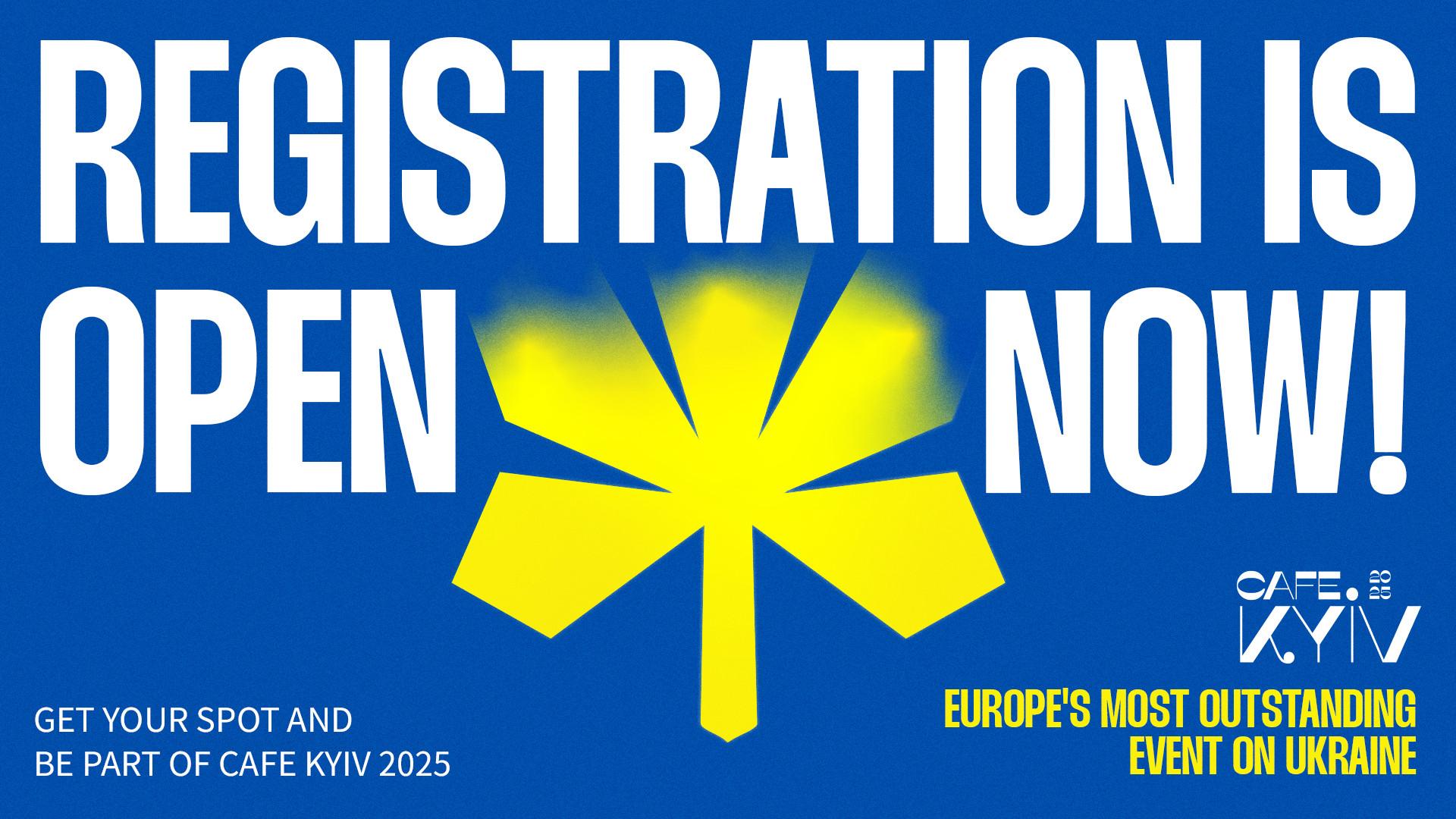
Cafe Kyiv 2025 Registration
Register today for Cafe Kyiv 2025 and look forward to exciting guests and a varied programme.
Register now


